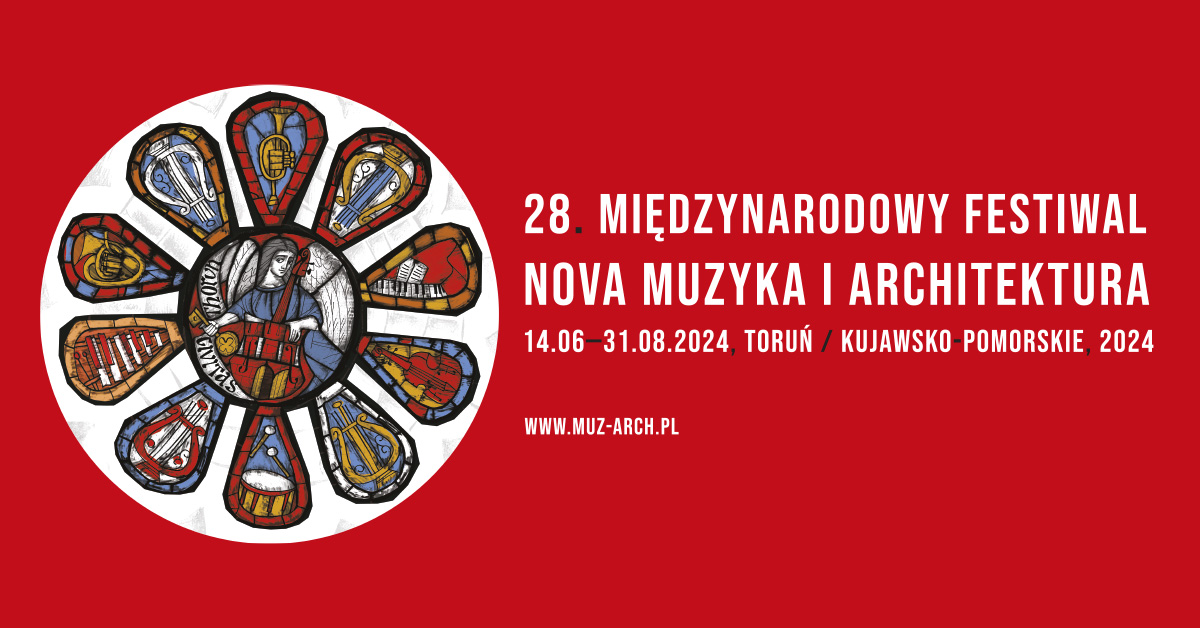Adam Wesołowski
Composer, music theorist, conductor and cultural manager. He has received numerous international awards for his artistic achievements, including the Bronze Medal ‘Meritorious for Culture Gloria Artis’ bestowed by the Minister of Culture and National Heritage in 2020. Adam Wesołowski is a laureate of the Silesian Voivodeship Marshal’s Award for his contributions to the dissemination and preservation of cultural heritage. He has also won several composition competitions, including the prestigious International Antonín Dvořák Composition Competition and the Adam Didur National Composition Competition (twice).
In 2004, he graduated with distinction from the Karol Szymanowski Academy of Music in Katowice, where he studied composition under the guidance of Edward Bogusławski and Aleksander Lasoń, and piano under Wojciech Świtała. He also completed his studies in music theory two years later. Adam Wesołowski is the director of the International Grzegorz Gerwazy Gorczycki Festival, one of the largest music festivals in Poland. He previously held the position of deputy director at the Sinfonietta Cracovia - Orchestra of the Royal Capital City of Kraków from 2014 to 2018. Prior to that, he served as the manager of the Chamber Orchestra of the City of Tychy - AUKSO from 2009 to 2014.
He is also a member of the Union of Polish Composers. Adam Wesołowski has composed more than 60 works and created more than 100 musical arrangements. His compositions have been performed both in Poland and abroad at numerous concerts and festivals, including the Pablo Casalsa Festival (France), A. Dvořák Festival (Czech Republic), Unterm Radar (Germany), the European Festival of Jan Kiepura, Crazy Days of Music - La Folle Journée de Varsovie, Odessa Days International Festival (Ukraine), 'Emanations' Festival at the Krzysztof Penderecki European Music Centre, Silesian Composers' Tribune, Polish Film Festival in Gdynia, the Adam Didur Festival, and New Music Festival.
His music has resonated in prestigious concert halls such as the Berlin Philharmonic, Wiener Konzerthaus, Polish National Radio Symphony Orchestra in Katowice, National Forum of Music in Wrocław, Grand Theatre of the National Opera in Warsaw, and ICE Kraków. It can also be heard at numerous seasonal concerts featuring such renowned bands as the National Philharmonic Orchestra in Warsaw, Sinfonia Varsovia Orchestra, Kammersymphonie Berlin, The U.S. Army Orchestra, Polish National Radio Symphony Orchestra in Katowice, the Sinfonietta Cracovia - Orchestra of the Royal Capital City of Kraków, the Chamber Orchestra of the City of Tychy - AUKSO, Tanzformation and Wiener Opernball Orchester, National Odessa Philharmonic Orchestra, German Brass, Viener Kammersymphonie, Morphing Chamber Orchestra Vienna, and the Philharmonic Orchestras of Gdańsk, Sopot, Toruń, Bydgoszcz, Białystok, Kraków, Zielona Góra, Łomża, Elbląg, Warsaw, Zamość, Zabrze, Ostrava and Kaunas.
Adam Wesołowski’s works are performed by exceptional soloists and conductors, including Andriy Yurkevych, Jerzy Maksymiuk, Steven Mead, José Maria Florêncio, Hobart Earle, Yaroslav Shemet, Massimiliano Caldi, Marek Moś, Valeriy Sokolov, Robert Benton, Alexander Humala, Uwe Theimer, Łukasz Długosz, Hubert Zapiór, Marek Torzewski, Andrzej Lampert, Grażyna Brodzińska, Jurek Dybał, Piotr Sałajczyk, Justyna Steczkowska, Marcin Wyrostek, Krzysztof Cugowski, Marek Toporowski, Natalia Rubiś, Katarzyna Moś, Kasia Kowalska, Anna Rusowicz and more.
Adam Wesołowski is also credited as the author of bugle calls for the towns of Radzionków and Świętochłowice.
He has recorded numerous CDs, and his works have been featured on Polish Radio, Deutsche Radio Kultur, and Polish Television.

Aleksandra Nowak
She embarked on her musical education at the age of seven at the Artur Rubinstein State Music School Complex in Bydgoszcz. In 2013, she became a student of the Class of Talents in Bydgoszcz under the guidance of Prof. Tomasz Strahl and Iwona Michalak, MA. She continued her studies at the Grażyna and Kiejstut Bacewicz Academy of Music in Łódź with Prof. Stanisław Firlej and Dr. Tomasz Daroch, and later at the Feliks Nowowiejski Academy of Music in Bydgoszcz with Prof. Andrzej Bauer, Dr. Bartosz Koziak, and Magdalena Bojanowicz.
Aleksandra Nowak is a laureate of national and international competitions, including first place at the National Cello Confrontations named after Zdzisława Wojciechowska and third place at the International Cello Competition in Prague. She has participated in various solo, chamber, and orchestral music festivals and courses on multiple occasions.
Julianna Vinci i Bartłomiej Fraś
Julianna Vinci and Bartłomiej Fraś have been performing together in various chamber ensembles since 2018. Both of them are students at the Karol Szymanowski Academy of Music in Katowice, with Julianna Vinci studying cello under the guidance of Natalia Kurzac-Kotula, and Bartłomiej Fraś studying violin with Prof. Szymon Krzeszowiec. In 2020, they formed a duo and started collaborating, showcasing a diverse repertoire ranging from baroque to contemporary music. They have achieved top honours in numerous competitions in Poland and abroad, including London, Salzburg, and Athens. They have refined their solo and chamber music skills under the guidance of esteemed pedagogues such as Zakhar Bron, Pinchas Zukerman, Gidon Kremer, Amanda Forsyth, Alexander Gebert, Danjulo Ishizaka, Maria Szwajger-Kułakowska, Marek Moś, Paweł Głombik, Konstanty Andrzej Kulka, and Martyna Pastuszka.
Bartłomiej Fraś has received scholarships from the Minister of Culture and National Heritage twice (in 2016 and 2020) and has also been a recipient of the Young Poland Scholarship Programme. Julianna Vinci was awarded a scholarship from the Ministry of Culture and National Heritage in 2021.
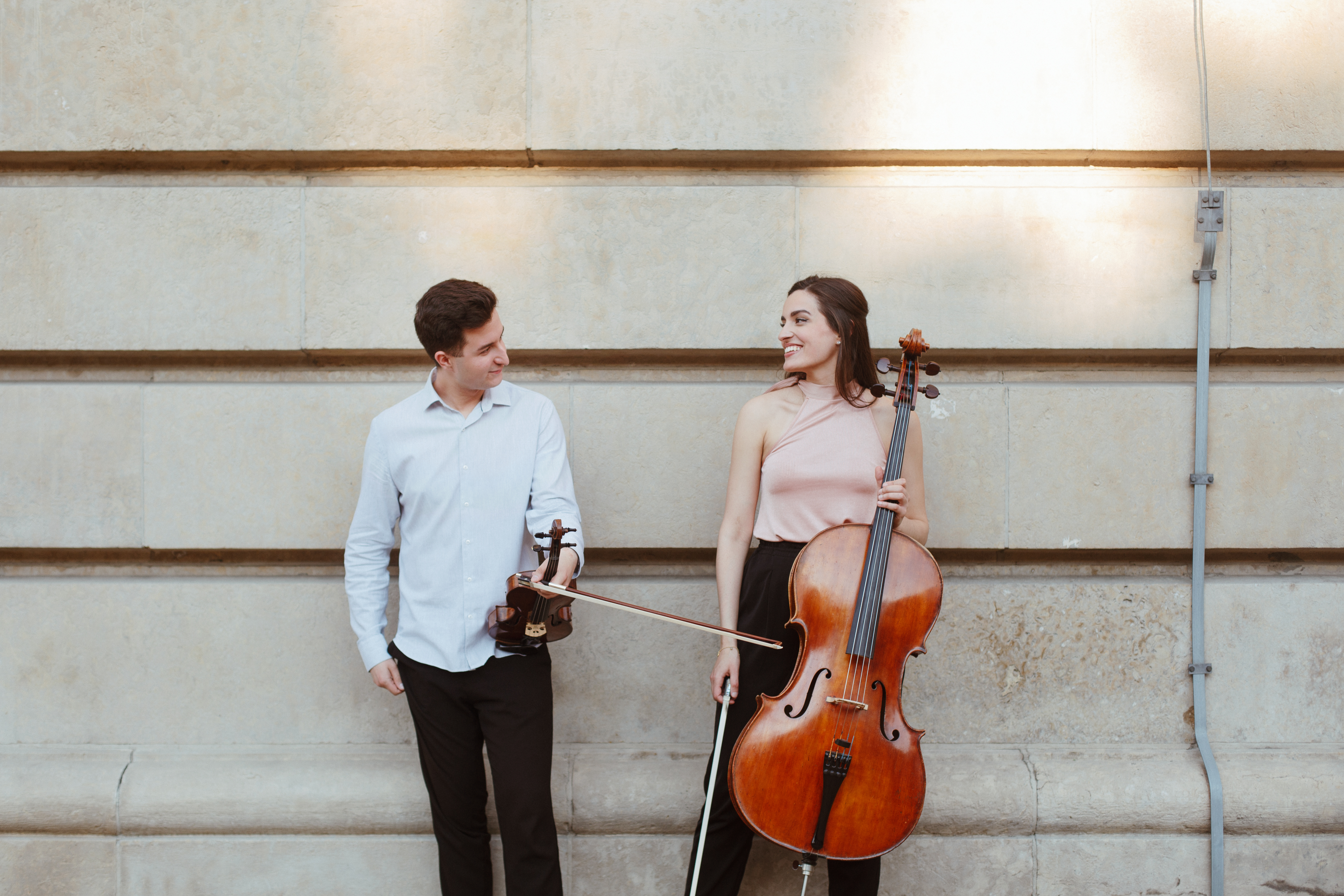
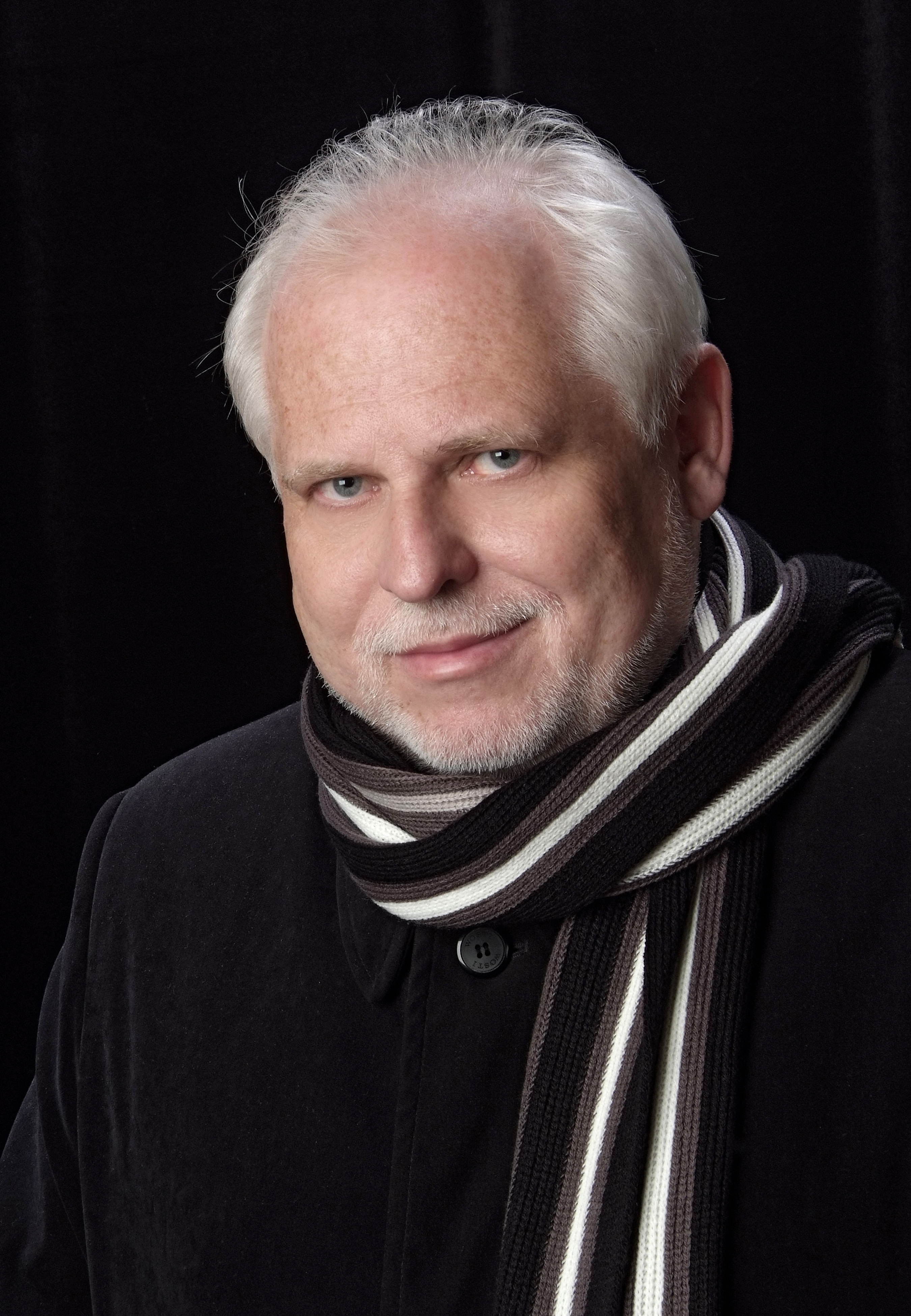
Bernard Chmielarz
Bernard Chmielarz is a composer, arranger, conductor, and instrumentalist who graduated from the Fryderyk Chopin University of Music (formerly the Chopin Academy of Music) in Warsaw. He worked as a double bassist in the Polish Radio and Television Orchestra in Warsaw from 1985-1986 and then in the Warsaw National Philharmonic Orchestra from 1986 to 2007. As an instrumentalist and conductor, he has collaborated with various Warsaw theatres, including the Polish Theatre, the Contemporary Theatre, the Ateneum Theatre, and the National Theatre.
In 2005, he started work on a musical television programme called “Co tu jest grane?” [What’s being played?], in which he worked alongside director Jacek Kęcik and pianist Waldemar Malicki. Two years later, the programme evolved into the music show 'Filharmonia Dowcipu' [The Philharmonic of Wit], which aired regularly on Polish Television.
Bernard Chmielarz served as the musical director, conductor, and composer/arranger for all the music used in the programme. Performances of 'Filharmonia Dowcipu' have been featured multiple times on Polish Television (also under the title 'Laskowik & Malicki'), as well as at The Edinburgh Festival Fringe in Scotland (2014) and during a tour of China (2017).
Bernard Chmielarz has hosted and prepared numerous special event concerts for TVP, including the Sports Champions Galas (2007, 2008, 2009, 2010, 2011, 2012), the Gala commemorating the 100th anniversary of Polish Motion Pictures, and a performance dedicated to Marek Grechuta. He was the music director of the National Festival of Polish Song in Opole in 2010 and orchestrated Kenji Kawai’s music for the Polish-Japanese film ‘Avalon’ (2000), directed by Mamoru Oshii.
Bernard Chmielarz is the author of hundreds of arrangements, including Villa Lobos' works recorded by the chamber orchestra of the Academy of Saint Martin of the Fields conducted by José Maria Florencio, featuring guitarist Krzysztof Mesinger (Melodia Sentimental, 2013). He also arranged works by Astor Piazzolla for Krzysztof Meisinger with Sinfonia Varsovia (Astor, 2016) and with Capella Bydgosiensis (Soledad, 2009).
Additionally, Bernard Chmielarz’s arrangements are frequently performed by the renowned pianist Waldemar Malicki, including on the album ‘El Tango’, which features music by Astor Piazzolla for piano and orchestra (performed by the Little Philharmonic Orchestra conducted by Marcin Nałęcz-Niesiołowski).
In the Chopin year of 2010, Bernard Chmielarz composed Tangos for piano and string quintet based on themes by Frederic Chopin, including the Waltz in C sharp minor and Prelude in E minor.
Bernard Chmielarz’s repertoire of orchestral and chamber music compositions includes: the Paraphrase of a Mazurka from Stanisław Moniuszko’s ‘Haunted Manor’ for piano and string orchestra (2019), Ostinato for string orchestra (2003), Introduction and Allegro for string orchestra (2002), Sounds of Europe - Instrumental Suite for 9 Instruments (2003), Piano Trio (2002), Crazy Taxi Driver’s Song for soprano saxophone/clarinet and piano (2004), Kurdeweil for alto saxophone and piano (1998), Songs for Children to lyrics by Eve Zelenay (1997) featuring the well-known song ‘In the Maze of My City’, and Suite of Carols in the style of various composers for piano and symphony orchestra (1999-2000).
For the Olsztyn ensemble Pro Musica Antiqua, he composed cycles of miniatures, including Castle Epigram, Forest Fantasia, Masurian Suite for flute, oboe, bassoon and harpsichord, and Morning of a Faun for flute and marimba (2019).
His songs and arrangements have been recorded on over a dozen CDs.
Chór Astrolabium
The Astrolabium Choir was established in October 1999 and has grown from a small group to an ensemble of approximately 40 choristers. While they all have professional or academic commitments, they find time to pursue their passion for singing together. Initially, the choir rehearsed at the Toruń branch of Caritas. From July 2001 to September 2003, the ensemble conducted artistic activities under the auspices of the academic church of the Jesuit fathers. From September 2003 to December 2011, they were affiliated with the Higher School of Banking in Toruń.
The name ASTROLABIUM symbolizes the choir’s connection to the city of Copernicus, as the Toruń-born astronomer is often depicted with this instrument in hand. For the choristers, the name represents their aspirations and the challenges they face in promoting their city at home and abroad, becoming a source of pride for Toruń. Their success in achieving this goal is evidenced by the Thorunium Medal, an honour bestowed upon them by the Mayor of the City of Toruń. Since its establishment, Astrolabium has actively participated in the cultural life of Toruń, engaging in various events, festivals, and competitions both domestically and internationally. The choir performs a diverse repertoire, including religious, secular, folk, and pop music, with a special focus on works by contemporary composers. In addition to a capella performances, the choir collaborates on numerous vocal and instrumental projects.
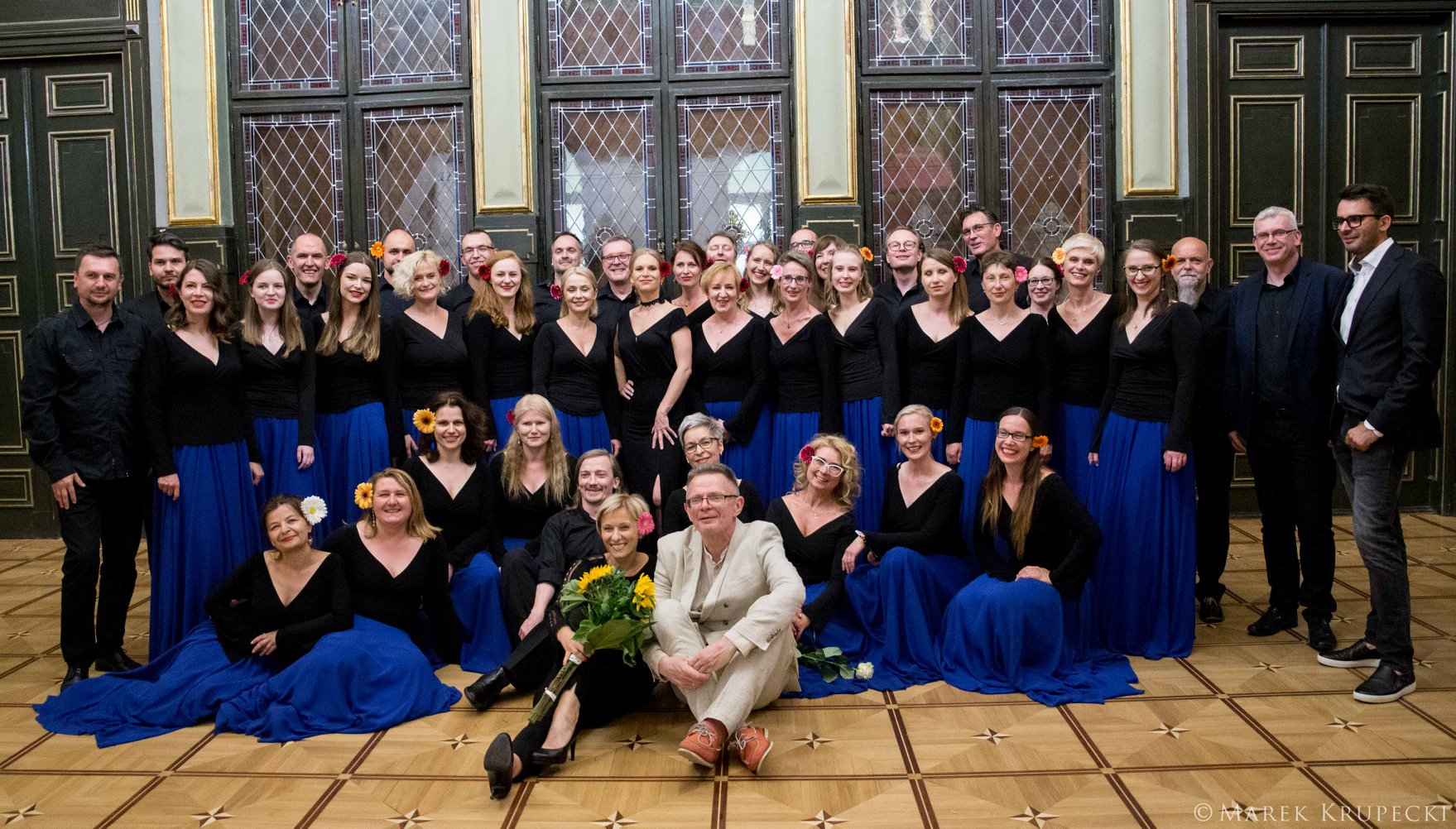
Dabyeot Youth Winds Orchestra
Dabyeot Youth Wind Orchestra na co dzień rezyduje w Hamyang-gun, w prowincji Południowe Gyeongsang w Korei Południowej. Dabyeot to tradycyjna koreańska nazwa regionu Hamyang i oznacza miejsce, w którym zawsze świeci słońce- Junghwan Lee, jeden z realistycznych myślicieli dynastii Joseon, nazywał je w swoim dziele Taekriji “najlepszym miejscem do życia”. Otoczone parkami narodowymi Jiri-san od południa i Deokyu-san od północy Hamyang-gun znane jest jako miejsce narodzin wielu słynnych uczonych już od zamierzchłych czasów.
W latach 60. XX wieku w regionie Hamyang rezydowało ponad 10 orkiestr, jednak ze względu na problemy związane z industrializacją większość z nich rozwiązała działalność. Jednakże nowe stulecie przyniosło ze sobą nową falę zainteresowania orkiestrami i uczniowie szkół podstawowych, średnich oraz studenci utworzyli wspólnymi siłami Dabyeot Youth Wind Orchestra w 2005 roku.
Obecnie w skład Dabyeot Youth Wind Orchestra wchodzi około 80 kobiet i mężczyzn, których celem jest kultywowanie uznania dla orkiestr dętych na całym świecie. W 2009 roku zespół został zaproszony na 2009 JIWEF (Jeju International Wind Ensemble Festival) organizowany przez Jeju Art Center odbywający się w różnych punktach na wyspie, m.in. otoczeniu malowniczych wodospadów Cheonjiyeon gdzie zagrał wówczas zespół, dając niezapomniany występ. Ciepłe przyjęcie przez widzów festiwalu zainspirowało grupę do dalszego rozwoju, tworząc przy tym serię niepospolitych występów, które po dziś dzień zachwycają widzów swoimi “muzycznymi promieniami”. W ciągu roku orkiestra gra na różnych lokalnych festiwalach; jej członkowie mają jednak nadzieję, że uda im się także częściej występować na festiwalach zagranicznych, nie tylko w Europie ale i na całym świecie.
Pragniemy waszego wsparcia i pomocy w naszej podróży dookoła świata. Chcemy stworzyć wspólnie z wami wiele przepięknych wspomnień, a także zaprosić was w przyszłości na koncert w nasze rodzinne strony- do Hamyang-gun. Dziękujemy.
(źródło: oficjalna strona http://dabyeot.or.kr/en/info.php?ckattempt=1 )
Dainius Pavilionis
Dainius Pavilionis was born on 7 September 1977 in Marijampolė, Lithuania, he began studying choral conducting at the Juozas Gruodis College of Music in Kaunas in 1992. Upon graduation in 1996, he enrolled in the Lithuanian Academy of Music (LMA), where he studied choral conducting under Professor Povilas Gylys. In 2002, he began his postgraduate studies at the Faculty of Opera and Symphony Conducting of LMA in the class of Professor Juozas Domarkas, and graduated in 2006. Soon thereafter, he started work as a lecturer at his alma mater's Faculty of Conducting. In 2006, he was appointed the second bandmaster of the Lithuanian Armed Forces Headquarters Band. The music community quickly recognised Dainius Pavilionis as a talented conductor and invited him to conduct concerts with the participation of two major symphony orchestras in Vilnius: the Lithuanian National Symphony Orchestra and the State Symphony Orchestra, and to work with orchestras from Poland, Portugal, Italy and Belarus. In 2010–2015 he was the principal conductor of the Klaipėda State Music Theatre, where he prepared and conducted, among others, the following operas: ‘Die lustigen Weiber von Windsor’ by O. Nicolai, ‘Suor Angelica’ by G. Puccini, ‘Grafin Mariza’ by I. Kalmann, ‘Queen of Spades’ by P. Tchaikovsky and I. Morozov's ballet ‘Doctor Aibolit’. Since 2017, Dainius Pavilionis has been the head of the Department of Symphonic Conducting at the Lithuanian Academy of Music and Dance in Vilnius. Among his many awards are 3rd Prize at the 4th Witold Lutosławski International Competition of Young Conductors in Białystok (2006) and 6th prize at the 8th Grzegorz Fitelberg International Competition for Conductors in Katowice (2007). Dainius Pavilionis conducts symphony orchestras not only in Lithuania and Poland. He is invited to conduct concerts all over Europe. From September 1, 2020 he is the deputy artistic director of the Toruń Symphony Orchestra.
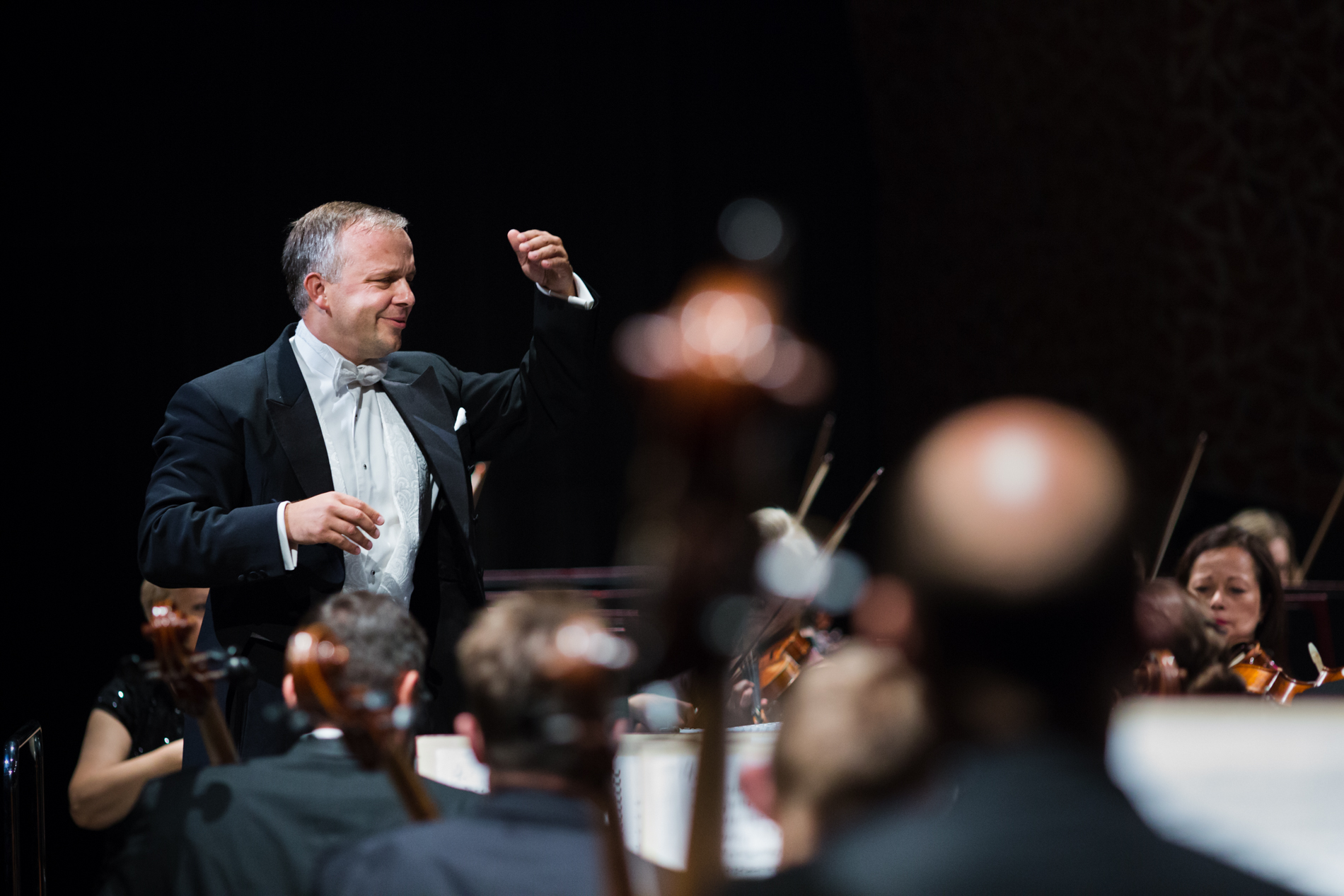
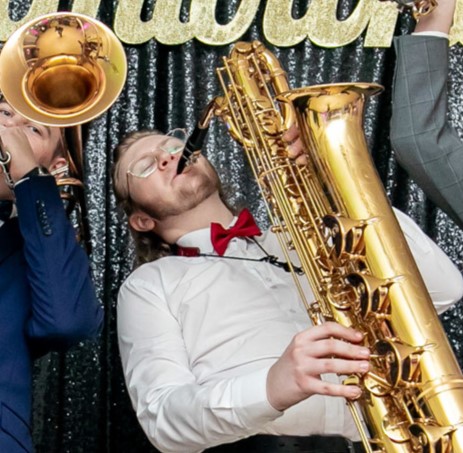
Dawid Kameduła
Dawid Kameduła is a saxophonist and a student at the Juliusz Zarębski Music School (2nd degree) in Inowrocław, studying under the guidance of Paweł Trawczyński. He has participated in various competitions, including those in Chełmno, Grudziądz, and Inowrocław. In 2018, he received an honourable mention at the 7th Kuyavian Encounters in Radziejów. He has also taken part in the European Saxophone Forum in Wrocław in 2017 and 2019, participating in various projects, including the ‘Saxophone Orchestra’.
Małgorzata i Jakub Marciniak
Małgorzata and Jakub Marciniak are a married couple of talented musicians. Together, they form a unique duo combining saxophones with vibraphone and other percussion instruments. Their music comprises original compositions that incorporate elements of classical, jazz, and folk genres. Their latest programme, ‘Impressionist Meditations’, premiered at the XXII International Festival "Music in the Cathedral" in Kołobrzeg in 2022. In the musical impressions, the ensemble draws inspiration from the works of French impressionist masters, including Ravel, Debussy, and Roussel, to create an original sound that transcends genre boundaries.
Gosia Marciniak is a percussionist who graduated from the Academy of Music in Poznań and also studied at Universität Der Künste in Berlin. She is a scholarship holder of the Ministry of Culture and National Heritage and was awarded first prize at the 10th Italy Percussion Competition. With a versatile musicality, she explores various styles ranging from early music to contemporary improvised music. Gosia is a percussionist at the Musical Theatre in Poznań and collaborates regularly with numerous orchestras both in Poland and abroad.
Kuba Marciniak is a jazz saxophonist, multi-instrumentalist, and composer. He graduated from the Jazz Institut Berlin and the Academy of Music in Wrocław. Kuba has collaborated with esteemed artists such as Piotr Wojtasik, Włodek Pawlik, and Leszek Możdżer. As a member of the Weezdob Collective, he has received numerous awards at prestigious competitions in Poland and internationally, including the Grand Prix at the 'Bielska Zadymka' Jazz Festival, Jazz on the Oder Festival, and Jazz Fruit in Prague.
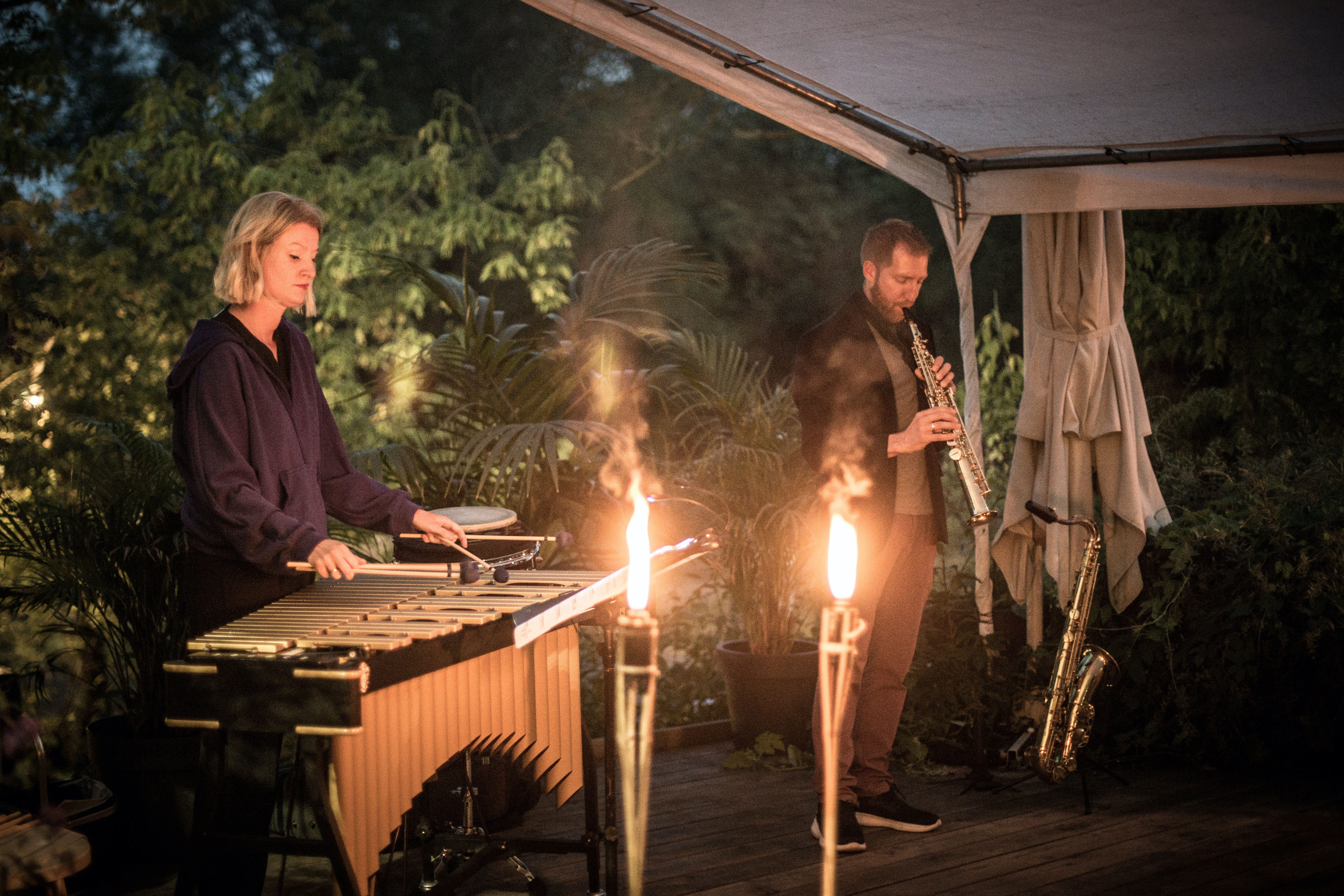
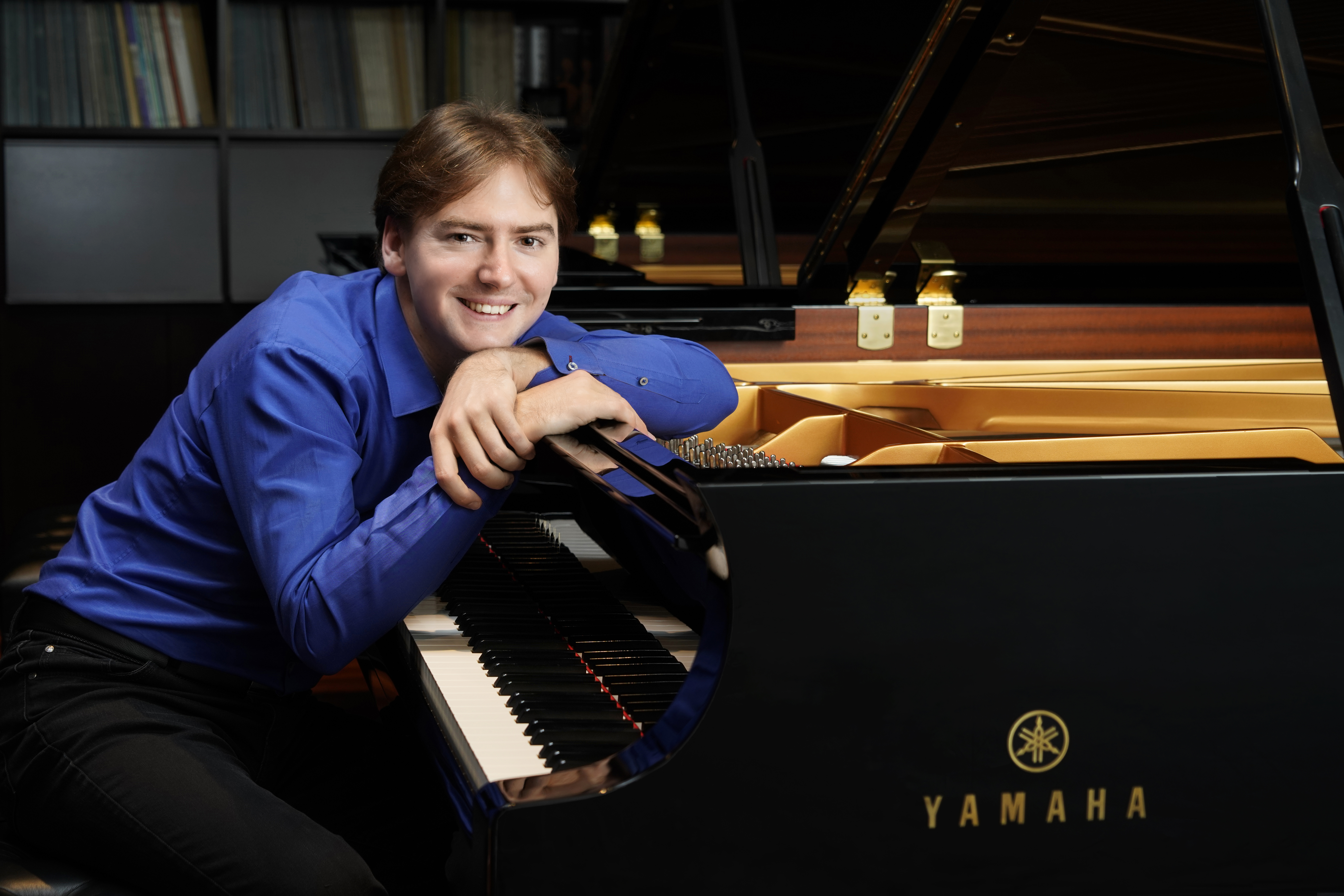
Grzegorz Niemczuk
„Jego grę wyróżnia płynność, bardzo szeroki zakres dynamiki, od głośnego forte po szepczące pianissima, różnorodność barw i kolorów oraz olśniewająca wirtuozeria.”
The Epoch Times, New York,
Zdolny, muzykalny bardzo, ma dużo do powiedzenia w pianistyce, ma urok jego granie, a szkoła pianistyczna nieskazitelna. Brawo, brawo, brawo! Bogusław Kaczyński (2010)
„Pianista znakomicie cieniował niuanse światłocienia oraz swoją uduchowioną interpretacją wprowadził nas w poetycki nastrój (...). Odczuliśmy, jakby razem z Niemczukiem sam Chopin był obecny w sali koncertowej: rozmarzony, nostalgicznie wędrujący i poszukujący”
Nobuko Fujimaki, Chopin Magazine, Tokio, sierpień 2017
„Grzegorz Niemczuk to naprawdę wspaniały talent i wyjątkowo fascynujący artysta.”
Jerome Rose (2015)
Grzegorz Niemczuk – pianista klasyczny, kompozytor, youtuber/influencer, popularyzator muzyki klasycznej. Należy do elitarnego grona pianistów posiadających w swoim repertuarze wszystkie utwory fortepianowe Fryderyka Chopina. W latach 2020-2021stworzył bezprecedensowy i unikatowy w skali świata projekt nagrań filmów-wykładów o wszystkich utworach Fryderyka Chopina, przeznaczonych przede wszystkim dla melomanów, chcących głębiej zrozumieć arcydzieła najwybitniejszego polskiego kompozytora. Powstało blisko 400 odcinków w dwóch wersjach językowych (polskiej i angielskiej), opublikowanych na YouTube oraz na stronie artysty na Facebooku.
W styczniu 2017 roku Program Pierwszy Polskiego Radia zestawił chopinowskie interpretacje Niemczuka w jednym szeregu z tak wybitnymi artystami jak Martha Argerich, Maurizio Pollini i Adam Harasiewicz. Niewątpliwie miała na to wpływ rozwijająca się w zawrotnym tempie kariera artysty, należącego obecnie do najbardziej aktywnych polskich pianistów klasycznych, który swymi podróżami koncertowymi po całym świecie kontynuuje tradycje Ignacego Jana Paderewskiego czy Artura Rubinsteina. Jego bogata, międzynarodowa kariera solowa, trwająca już 15 lat, zawiodła go do wielu prestiżowych sal koncertowych na całym świecie. Pianista wystąpił do tej pory z ponad 400 recitalami i koncertami, odwiedzając 35 krajów na 6 kontynentach (Polska, Czechy, Słowacja, Niemcy, Litwa, Rosja, Rumunia, Austria, Chorwacja, Serbia, Bułgaria, Szwajcaria, Włochy, Belgia, Francja, Hiszpania, Wielka Brytania, Finlandia, Norwegia, Etiopia, Tanzania, Japonia, Chiny, Korea Południowa, Singapur, Malezja, Australia, Peru, Brazylia, Ekwador, Kostaryka, Kolumbia, Stany Zjednoczone, Jamajka, Curacao). Często prowadzi swoje własne koncerty, wprowadzając słuchaczy w tajniki wykonywanej muzyki i przybliżając ciekawe fakty z biografii kompozytorów. Wszędzie, gdzie występuje, spotyka się z gorącym przyjęciem publiczności oraz krytyki, co skutkuje kolejnymi zaproszeniami na przyszłość. Szczególnie ceniony jest w Azji: po spektakularnym debiucie solowym w Tokio w lipcu 2017 roku, w prestiżowym magazynie „Chopin" ukazała się niezwykle entuzjastyczna recenzja, Ten występ zaowocował kolejnymi zaproszeniami na recitale w Japonii (Tokio, Osaka, Nagoja, Sapporo, Asahikawa, Obihiro, Hakodate, Aomori), jak również kontraktem z magazynem „Chopin" na comiesięczne artykuły o wykonawstwie muzyki F. Chopina. W grudniu 2017 zadebiutował w Chinach, gdzie w ramach Festiwalu "Polskie Kręgi Sztuki" (największego festiwalu polskiej sztuki w Chinach) wystąpił w prestiżowej Beijing Concert Hall. Koncert ten odbił się szerokim echem we wszystkich najważniejszych mediach chinskich. Jest również ulubieńcem norweskiej publiczności – wystąpił do tej pory w 40 różnych miastach Norwegii, wszędzie wzbudzając wielki entuzjazm i otrzymując zaproszenia na kolejne występy.
Wśród sal koncertowych, które gościły Grzegorza znajdują się tak prestiżowe jak m.in. Carnegie Hall, Steinway Hall w Nowym Jorku, Kioi Hall, Tokyo Bunka Kaikan w Tokio, Beijing Concert Hall w Pekinie, Quintai Concert Hall w Wuhan, Guotai Arts Center w Chongquing, Busan Cultural Center w Busan, Teatro Puccini w Mediolanie, Teatro Sergio Cardoso w Sao Paulo, Centro Cultural de Sao Paulo, Capela Santa Maria w Kurytybie, Teatro Civico w Vercelli, Palau de la Musica Catalana w Barcelonie, Victoria Concert Hall w Singapurze, Collonge-Bellerive w Genewie, Muzeum F. Liszta w Weimarze, Konserwatorium Muzyczne w Shanghaju, Carskie Sioło w Petersburgu, Filharmonia Narodowa w Warszawie, Filharmonia Krakowska, Teatr Wielki Opera Narodowa, Zamek Królewski w Warszawie. Pianista posiada bardzo rozbudowany repertuar obejmujący ponad 250 utworów solowych i 28 koncertów na fortepian z orkiestrą od epoki baroku po muzykę XX i XXI wieku.
Grzegorz Niemczuk jest zwycięzcą wielu konkursów pianistycznych. W 2013 roku wygrał – jako pierwszy Polak w historii – „International Carnegie Hall Concerto Debut Competition" w Nowym Jorku. Ta prestiżowa nagroda otworzyła mu drogę do Carnegie Hall, gdzie w lutym 2013 roku miał okazję zaprezentować II Koncert fortepianowy f-moll op. 21 F. Chopina, zbierając znakomite recenzje. W 2016 roku został finalistą oraz laureatem Nagrody Specjalnej na 2016 International Busan Maru Music Festival w Korei Południowej. Jest również zwycięzcą 40 Ogólnopolskiego Konkursu Pianistycznego im. F. Chopina w Warszawie w 2010 roku oraz międzynarodowych konkursów we Włoszech i Belgii.
W latach 2004 – 2010 studiował pod kierunkiem prof. Józefa Stompla (wybitnego polskiego pianisty i pedagoga, laureata Międzynarodowego Konkursu Chopinowskiego w Warszawie w 1960 roku). W latach 2009-2015 pozostawał pod artystyczną opieką amerykańskiego pianisty Jeffreya Swanna. Wielką rolę w rozwoju artystycznej osobowości pianisty odegrały lata 2008-2013, kiedy to uzupełniał swoje studia w Nowym Jorku jako stypendysta International Keyboard Institute & Festiwal (Mannes College of Music). Miał wówczas możliwość studiowania u światowej sławy pianistów, takich jak: Menahem Pressler (Indiana University), Jerome Rose (Mannes College of Music), Philippe Entremont (École Normale Supérieure de Musique de Paris), Joaquin Achucarro (Meadows School of the Arts), David Dubal (The Juilliard School), Choong-Mo Kang (The Juilliard School) czy Yuan Sheng (Central Conservatory of Music – Beijing).
Obecnie mieszka w Bielsku-Białej. Od października 2017 roku jest doktorem sztuki, pracując na Uniwersytecie Śląskim (Wydział Artystyczny) na stanowisku adiunkta. Jest również zapraszany do prowadzenia kursów mistrzowskich na wielu uczelniach muzycznych na całym świecie, w tym: the Nanyang Academy of Art w Singapurze, Norges Musikkhøgskole w Oslo, University in Agder, Kristiansand, University of the West Indies w Kingston na Jamajce, Uniwersytet Stanowy Santa Catarina we Florianopolis, Uniwersytet Stanowy w Porto Alegre, w Brazylii, Konserwatorium Muzyczne w Limie, w Peru, Xiamen University oraz Changde University w Chinach.
Hanna Herasymova-Liakhovych
Rozpoczęła edukację muzyczną w klasie fortepianu w szkole muzycznej im. H. Nehausa w Kirovohradzie w wieku 7 lat. Mając 19 lat rozpoczęła edukację z zakresu teorii muzyki na wydziale teorii muzyki w Wyższej Szkole Muzycznej w Kirovohradzie, kończąc je w 2003 roku z wyróżnieniem. W 2002 roku otrzymała stypendium mera Kijowa. W 2008 roku ukończyła z wyróżnieniem studia muzykologiczne na wydziale Edukacji Muzycznej w Kijowskiej Akademii Muzycznej im. R. Gliera. W latach 2008 – 2012 była na studia doktoranckich wydziału kulturoznawstwa na Kijowskiej Narodowej Akademii Muzycznej im. P. Czajkowskiego.
Od 2004 roku związana była z edukacją muzyczną, zaczynając od nauczania w Szkole Artystycznej w Kijowie. Pracowała jako nauczyciel - teoretyk w Szkole Artystycznej im. S. Turczaka w Kijowie. W 2008 roku rozpoczęła pracę jako metodyk działu edukacyjnego w Kijowskiej Akademii Muzycznej im. R. Gliera, a następnie w latach 2010 – 2012 była prodziekanem w powyższej akademii. Do 2022 roku była wykładowcą Katedry Historii Muzyki w Kijowskiej Akademii Muzycznej im. R. Gliera.
Od 2014 do 2020 roku pracowała jako akompaniatorka baletowa w Centrum Kultury Kijanoczka w Kijowie.
Jest autorką naukowych artykułów dotyczących powiązań tańca i muzyki, oraz funkcjonowania tańca w kulturze na przełomie wieków XIX i XX.

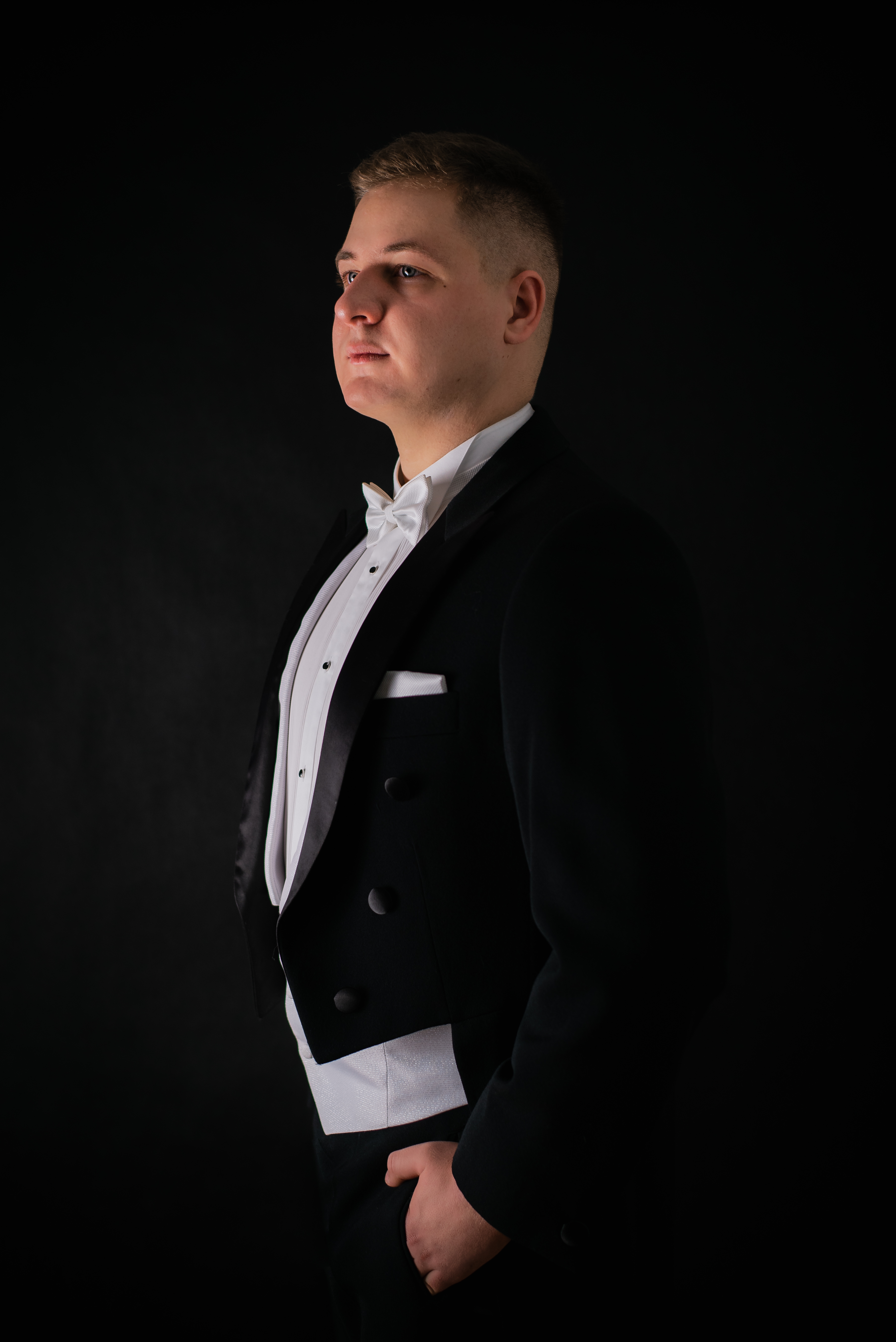
Jan Cieplik
During my elementary and junior high school years, I sang in the Boys and Men Cathedral Choir ‘Pueri Cantores Thoruniensis’ under the direction of Prof. Roman Grucza. From the age of nine, I had the opportunity to participate in numerous concerts, festivals, and competitions organized in Poland and abroad. I have honed my vocal skills through workshops led by esteemed figures such as Stefania Toczyska, Andrzej Dobber, Prof. Izabela Kłosińska, Prof. Maciej Witkiewicz, Prof. Feliks Widera, Prof. Jarosław Bręk and Prof. Leszek Skrla. Throughout my journey, I have collaborated with notable conductors, including Mieczysław Smyda, Michał Kocimski, Piotr Sułkowski, Marek Głowacki, and Jan Willem de Vriend. In February 2020, I had the privilege of participating in a concert at the Pomeranian Philharmonic, which showcased the most talented winners of music competitions. In December 2020, I contributed to the recording of songs for the album "Kolęda na ten trudny czas..." [A Carol for this Difficult Time...] published by the Grażyna and Kiejstut Bacewicz Academy of Music in Łódź. Additionally, in February 2021, I took part in recordings for the album "Stypendyści" [Scholars], released to commemorate the 100th anniversary of the Music School Complex in Toruń. Notable performances in my career include assuming the bass part in Wolfgang Amadeus Mozart’s Requiem in D minor KV 626 for the first time, in October 2021. In April and June 2022, I portrayed one of Ecclitico’s disciples in the opera "Il mondo della luna" by J. Haydn, staged in Poland and Norway. In April 2022, I performed the bass part in the oratorio "Messiah" (HWV 56) by G. F. Händel, and in May 2022, I portrayed the role of Schlendrian multiple times in the cantata "Schweight stille, plaudert nicht" BWV 211 by Johann Sebastian Bach, commonly known as the 'coffee cantata’. Moreover, in July 2022, I had the privilege of performing on the stage of the Oskar Kolberg Świętokrzyska Philharmonic alongside Monika Świostek, Jadwiga Postrożna, and Arnold Rutkowski, as part of the final concert of the 2nd Monika Swarowska-Walawska International Vocal Festival. My repertoire encompasses oratorios, cantatas, operas, and operettas. I have established a regular collaboration with the Toruń Symphony Orchestra and Opera Nova in Bydgoszcz. In 2020, I graduated from the Music School Complex (2nd degree) in Toruń, specializing in vocals under the guidance of Dr. Wiesława Kończewska-Plac. In 2022, I completed my degree in vocal and acting at the Grażyna and Kiejstut Bacewicz Academy of Music in Łódź, under the mentorship of Prof. Włodzimierz Zalewski. I have also been honoured to receive the Minister of Culture and National Heritage scholarship three times for my achievements and artistic contributions in 2018, 2019, and 2020. Additionally, I have been a recipient of the City of Toruń scholarship in the field of culture in 2019 and 2020.
Some of my notable achievements include second place in the 2nd Feliks Nowowiejski National Vocal Festival in Olsztyn third place in the 8th Krystyna Jamroz National Vocal Competition in Kielce, earning a distinction at the 3rd International Vocal Competition of Sacred Music 'Ars et Gloria' in Katowice, winning second place at the 8th Zdzisław Skwara National Vocal Competition in Mława, first place at the International Vocal Competition 'Bella Voce' in Busko-Zdrój, receiving a distinction and special prize at the National Vocal Competition 'Home Song Books' in Łódź, winning first place and a special prize at the 1st Stanisław Moniuszko National Vocal Competition in Gdańsk, first place and a special prize at the 1st International BEL CANTO Online Singing Competition in Ueckermünde, and achieving third place at the 2nd International Monika Swarowska-Walawska Vocal Competition in Krzeszowice.
Jeon Gae Jun
Jeon Gae Jun is a Korean conductor who has received a comprehensive musical education. He holds a degree from the Department of Music at Changwon National University and has obtained diplomas from the Gnesins Russian Academy of Music in Moscow (clarinet) and the Rostov State Conservatory (conductor). Currently, he works as a teacher at the Busan High School of Arts and also teaches at the Music Department of the Arts College. Jeon Gae Jun is an active member of several musical groups, including the Kyungnam Popular Music Orchestra, the Changwon Woodwind Quintet, the Changwon Tutti Ensemble, and the Municipal Symphony Orchestra. Furthermore, he holds the position of conductor for the Jinju Wind Orchestra and has been invited as a guest conductor for the Bulgarian National Symphony Orchestra and the National Symphony Orchestra 'Otlenia’. Additionally, Jeon Gae Jun works as the permanent conductor of the Dabyeot Youth Winds Orchestra in Hamyang. He continues to actively conduct the Busan High School of Arts Orchestra and occasionally serves as a guest conductor for the Pitesti Symphony Orchestra.
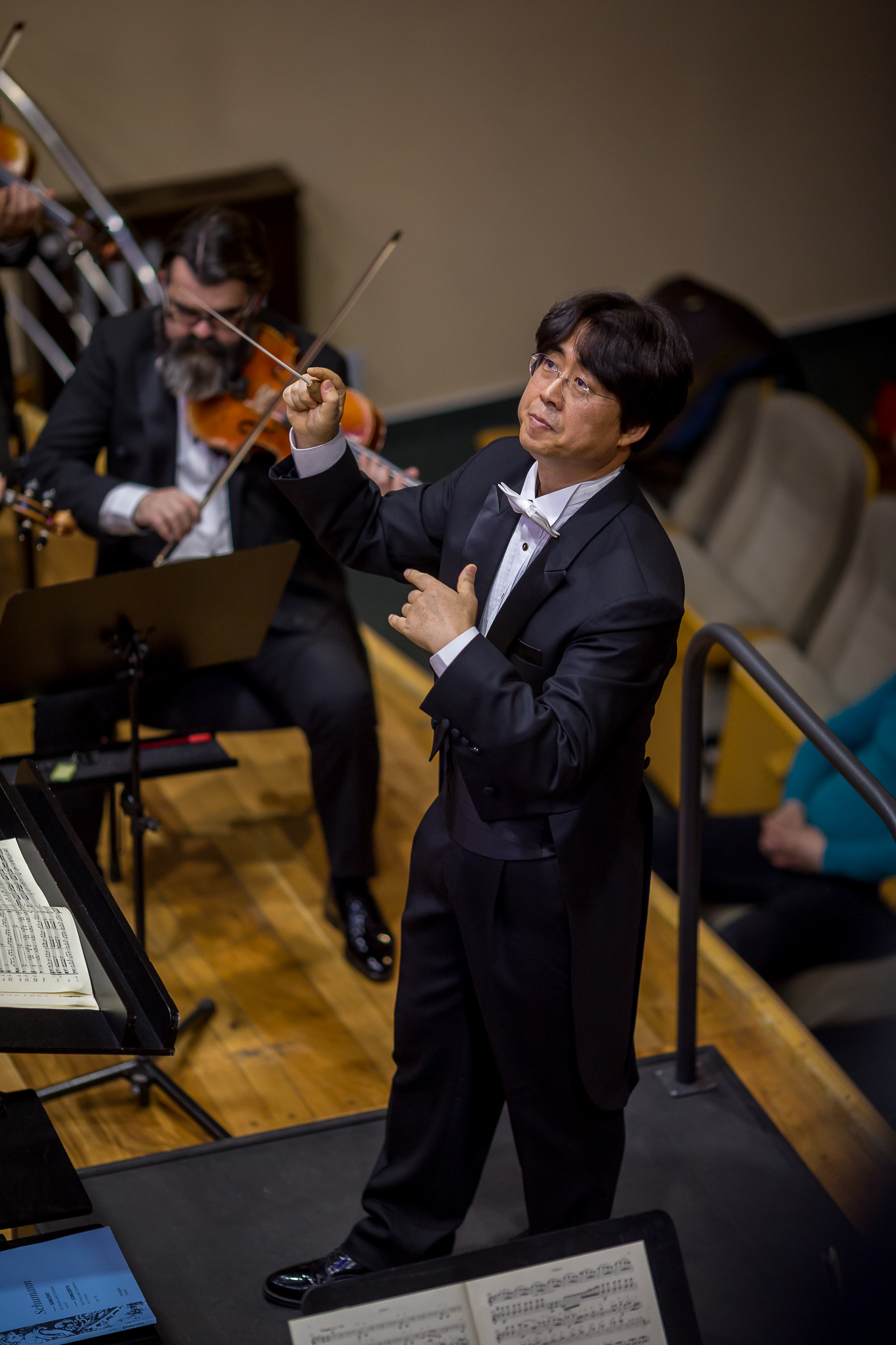

Katarzyna Dondalska
Katarzyna Dondalska należy do grona najwybitniejszych wirtuozów sopranowej techniki koloraturowej we współczesnej wokalistyce. Wielka śpiewaczka operowa Barbara Bonney, w wywiadzie udzielonym dla Telewizji BBC podczas Cardiff Singer of the World Festival, po wysłuchaniu śpiewu polskiej artystki, nazwała ją „Ósmym Cudem Świata". Trudno się dziwić takiemu entuzjazmowi – ktokolwiek chociaż raz usłyszy ten piękny, zmysłowy głos, fenomenalną technikę a nade wszystko swobodę w poruszaniu się w stratosferycznych przestrzeniach sopranu, będzie przekonany o słuszności tego stwierdzenia i autentycznego zachwytu wypowiadającej te słowa.
Katarzyna Dondalska jest kontynuatorką tradycji poruszania się po wokalnej stratosferze, wyznaczonych przez legendarne soprany koloraturowe, wśród których przede wszystkim należy wymienić Ernę Sack, Mado Robin oraz najbardziej fascynującą Bognę Sokorską.
Katarzyna Dondalska rozpoczęła swoją edukację muzyczną w wieku 5 lat. Podtrzymując rodzinną tradycję grała na skrzypcach. Zainteresowanie śpiewem pojawiło się z czasem i zaowocowało rozpoczęciem nauki pod kierunkiem Haliny Mickiewiczówny (pierwszej uczennicy wielkiej Ady Sari) w gdańskiej Akademii Muzycznej. Po roku studiów w Gdańsku na Wydziałach Instrumentalnym i Wokalno-Aktorskim, Katarzyna Dondalska kontynuowała je w Niemczech w Staatliche Hochschule für Musik Würzburg. Studia ukończyła uzyskując dyplom instrumentalny (skrzypce) oraz wokalny z wyróżnieniem w klasie mistrzowskiej. Jest finalistką i laureatką znanych międzynarodowych konkursów wokalnych, m.in. Internationaler Musikwettbewerb der ARD, Cardiff Singer of the World Festival, Koloratur-Gesangswettbewerb Sylvia Geszty w Luxemburgu. W 2011 r. otrzymała stopień doktora w dziedzinie sztuk muzycznych, dyscyplinie artystycznej wokalistyka przyznany przez Radę Wydziału Wokalno-Aktorskiego Akademii Muzycznej w Gdańsku.
Do jej znaczących ról należą: Królowa Nocy w Czarodziejskim flecie oraz Konstancja w Uprowadzeniu z seraju, Zerbinetta w Ariadnie na Naxos, Olimpia w Opowieściach Hoffmanna, Rozyna w Cyruliku sewilskim, tytułowa partia w operze Słowik I. Strawińskiego czy W. Braunfelsa. Wszystkie te partie kreowała na wielkich scenach operowych na świecie: Grand Opera Houston, Welsh National Opera Cardiff, Korean National Opera Seoul, Teatro Colon Buenos Aires, Teatro Lirico di Cagliari, Nationaltheater Mannheim, Teatr Wielki – Opera Narodowa w Warszawie.
Występowała na estradach znaczących sal koncertowych: New York Avery Fisher Concert Hall, Disney Concert Hall Los Angeles, Washington John F. Kennedy Center for the Performing Arts, Chicago Music Hall, John Bassett Theatre Toronto, Philadelphia Verizon Hall/The Kimmel Center, Copley Symphony Hall/San Diego, Paramount Theater/Seattle, Orpheum Theater/Vancouver, Royal Theater/Victoria, Salle Wilfrid-Pelletier/Montreal, National Arts Centre/Ottawa, Winspear Centre Edmonton, Jack Singer Concert Hall Calgary, Tonhalle Düsseldorf, Fruchthalle Kaiserslautern, Friedrichstadtpalast Berlin, Schloss Benrath Düsseldorf, Konzerthaus Stockholm, DR Koncerthuset Kopenhagen, Königin-Elisabeth-Saal/Antwerpia, Alte Oper Frankfurt, Kölner Philharmonie, Philharmonie Berlin, Carl-Orff-Saal am Gasteig München czy Konzerthaus am Gendarmenmarkt Berlin. Współpracowała ze znakomitymi orkiestrami: Royal Philharmonic Orchestra Liverpool, San Diego Symphony Orchestra, WDR Rundfunkorchester Köln, NDR Rundfunksinfonieorchester Hannover, Deutsches Filmorchester Babelsberg, BBC Orchestra London, Bruckner-Symphonieorchester Linz, Tonhalle Zürich, Auditorio Nacional de Música Madrid . Śpiewała pod batutą wybitnych dyrygentów: Wasilij Petrenko, Dennis Russell Davies, Roberto Abbado, Carlo Rizzi, Peter Falk, Michael Jurowski, Theodor Guschlbauer, Peter Guth, Klaus Arp, Philip Ellis, Richard Armstrong, Ira Levin, Hans Graf, Howard Griffiths, Marko Letonja, Gabriele Ferro, Grzegorz Nowak, Michał Dworzyński Marek Pijarowski, Mirosław Jacek Błaszczyk, Antony Hermus, Victor Pablo Pérez, Modestas Pitrénas.
Jej nazwisko pojawiało się na afiszach obok tak wielkich, światowego formatu artystów, jak Edita Gruberowa, Wiesław Ochman, Francisco Araiza, Elmar Gunsch, Günter Wewel, Gunter Emmerlich, Barbara Bonney, Pete York, Paul Esswood, Lanze Ryan, Stefan Pop, Desiree Rancatore, Dmitry Korchak, Anna Maria Kaufmann, Katherine Merling, Hanno Müller-Brachmann, Anna Goryachov, Sebastian Reinthaller, Tom Allen, Markus Werba, Diana Damrau, Maciej Pikulski, Madeleine Wehle, Brigitte Mira, Ingrid Surgenor, Ingrid Kreuder, Stefan Johannes Walter, Daniele Abbado, Bogusław Kaczyński, Alexander Petrov, Lesley Garrett, Ute Lemper, Till Brönner, Klaus Hoffmann, Joja Wendt, Gregory Peck czy Chris de Burgh. Jako pierwsza dokonała nagrań arii Karla Dittersa von Dittersdorf oraz pieśni religijnych Ottona Mieczysława Żukowskiego.
Katarzyna Dondalska została wyróżniona nagrodą „Ikony Warmii i Mazur 2018" przez Prezydenta Miasta Olsztyna Piotra Grzymowicza oraz Marszałka Województwa Warmińsko-Mazurskiego Gustawa Marka Brzezina za wybitne osiągnięcia artystyczne w kraju i na świecie. Artystka brała udział w nagraniu 13 płyt w wydawnictwie Acte Préalable oraz innych m.in. Musicon, Telos- Naxos Niemcy, Naxos Austria .
W roku 2020 otrzymał Złotą Odznakę Honorową Gryfa Zachodniopomorskiego.
W roku 2015 uzyskała stopień doktora habilitowanego sztuki muzycznej, od października 2015 r. pełni funkcję profesora nadzwyczajnego w Akademii Sztuki w Szczecinie.
W lutym 2021 r. otrzymała tytuł Profesora Sztuk Muzycznych od Prezydenta Polski.
W roku 2021 Katarzyna Dondalska została laureatką Zachodniopomorskich Nobli w dziedzinie nauk artystycznych
Kinga Kulbashna
Kinga Kulbashna started learning to play the violin at the age of seven at the K. Szymanowski Music School Complex in Toruń. She continued her studies at the Class of Talents at the Artur Rubinstein State Music School Complex in Bydgoszcz and later at the Feliks Nowowiejski Academy of Music, also in Bydgoszcz. In 2022, she graduated from Dr. Mariusz Patyra’s violin class.
Kinga has achieved success in various competitions and auditions both in Poland and abroad. She won first place in the National Confrontations of Chamber Ensembles, third place in the Citta di Filadelfia International Violin Competition in Italy, and third place in the OPUS 2021 International Music Competition. As a member of the Mariusz Patyra Quintet, Kinga has performed concerts at prestigious venues such as the Great Assembly Hall of the Royal Castle in Warsaw, the Szczecin Philharmonic, the National Philharmonic, and the National Forum of Music. She has also participated in numerous festivals, including Music at the Source, Festival dell'Arte, Emanations, and Music of Our Time. Additionally, Kinga was one of the performers at the Inauguration of the Musical Partnership Learning and Promotion Centre. She has also contributed to the recording of the album "Reminiscences: 30 years of the Paderewski Centre” in Kąśna Dolna.
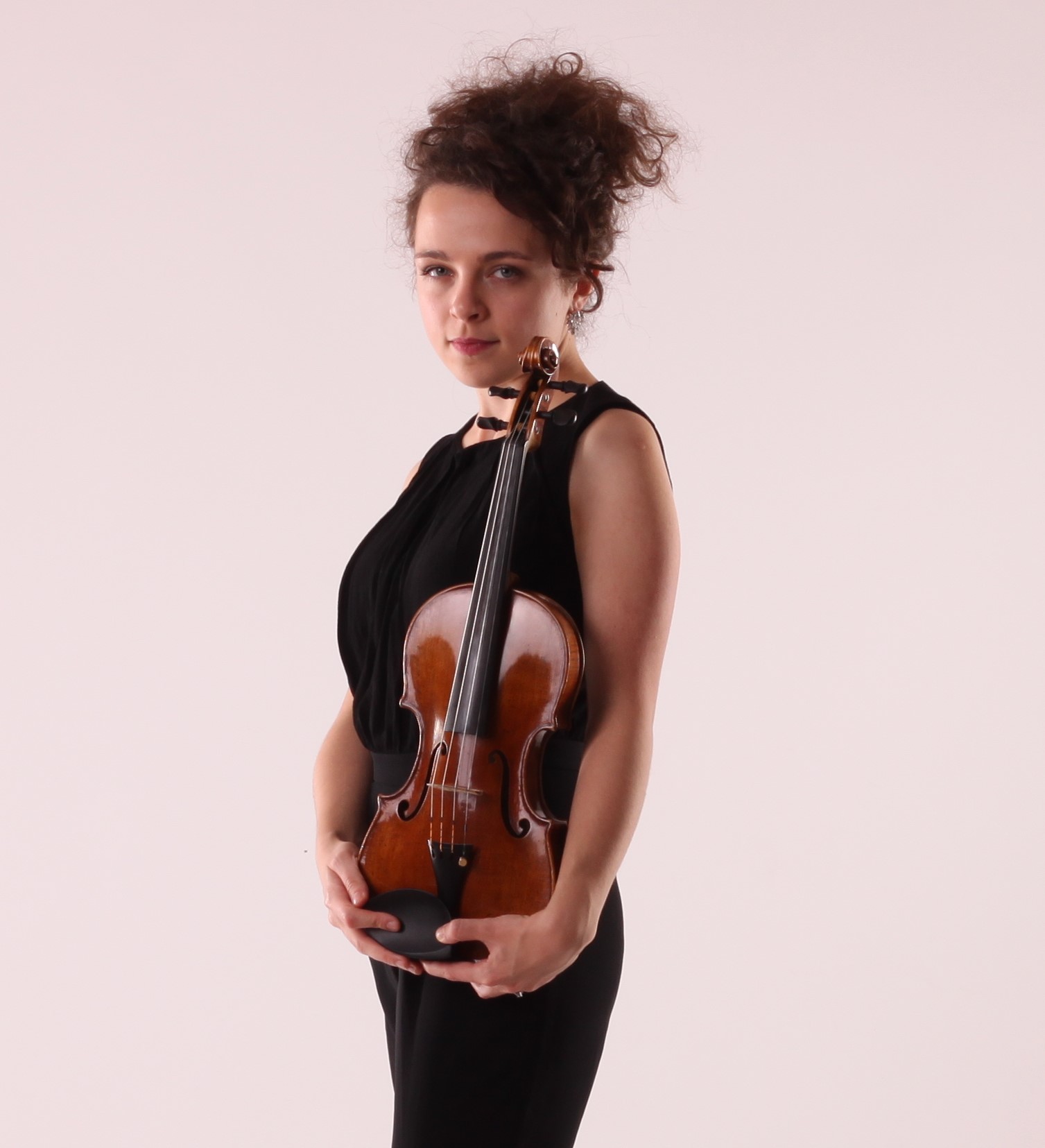
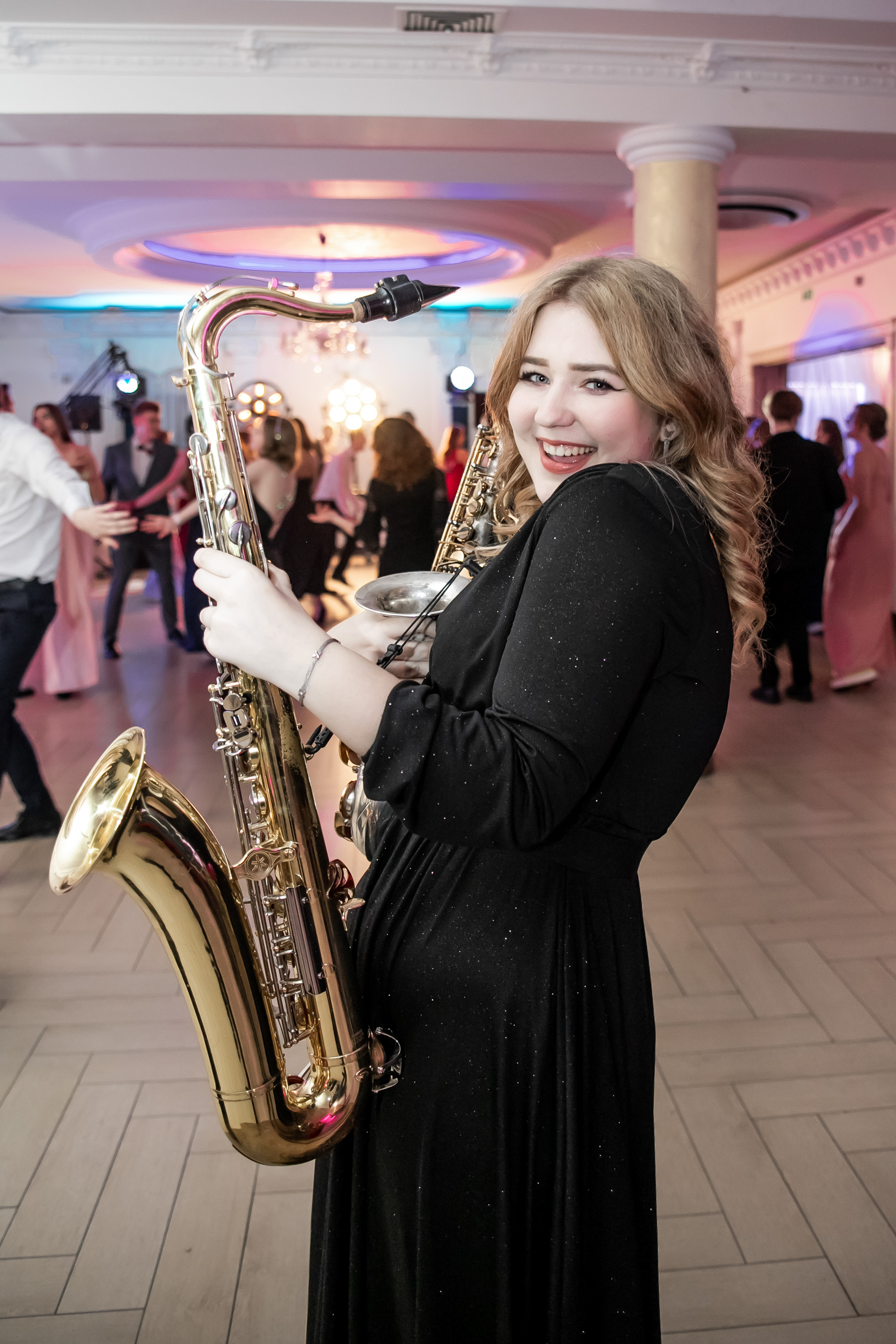
Marta Pińska
Marta Pińska has been playing the saxophone since the age of six. She initially played in a community wind orchestra and received recognition from the committee at the Kuyavian Meetings, where she achieved second place and an honourable mention in the following year. Marta actively participates in saxophone workshops, including those led by Jan Adamczewski in Ostrów Wielkopolski and the European Saxophone Forum in Wrocław. She is a graduate of the Radziejów Music School (1st degree) and the Juliusz Zarębski State Music School (1st and 2nd degree) in Inowrocław.
Marta Ustyniak - Babińska
Marta Ustyniak-Babińska graduated with honours from the Department of Vocal Performance at the Feliks Nowowiejski Academy of Music, where she studied under the guidance of Prof. Katarzyna Nowak-Stańczyk. She made her debut on the stage of the Musical Theatre in Poznań in February 2009 and also performed as part of the Opera Forum for the Youth on the chamber stage of Opera Nova in Bydgoszcz, where she portrayed the role of Franzi in J. Strauss’ operetta “Vienna Blood”.
Her achievements include winning third place at the 7th International Vocal Competition ‘Golden Voices of Mazovia' and receiving a distinction at the Iwona Borowicka National Competition for the Performance of Operetta and Musical in 2012.
Currently, she holds the position of soloist at Opera Nova in Bydgoszcz. Marta has portrayed various soprano roles, including Adina in G. Donizetti’s “The Elixir of Love”, Musetta in G. Puccini’s “La Bohème”, Rosina in G. Rossini’s “The Barber of Seville”, Susanna in “The Marriage of Figaro”, Adela in J. Strauss’ “The Flittermouse”, Arsena in J. Strauss’ “The Gypsy Baron”, and most recently Despina in W. A. Mozart’s “Cosi fan tutte”, Dot in M. Małecki’s “Opera Dizziness”, and Valentina in F. Lehar’s “The Merry Widow”.
.
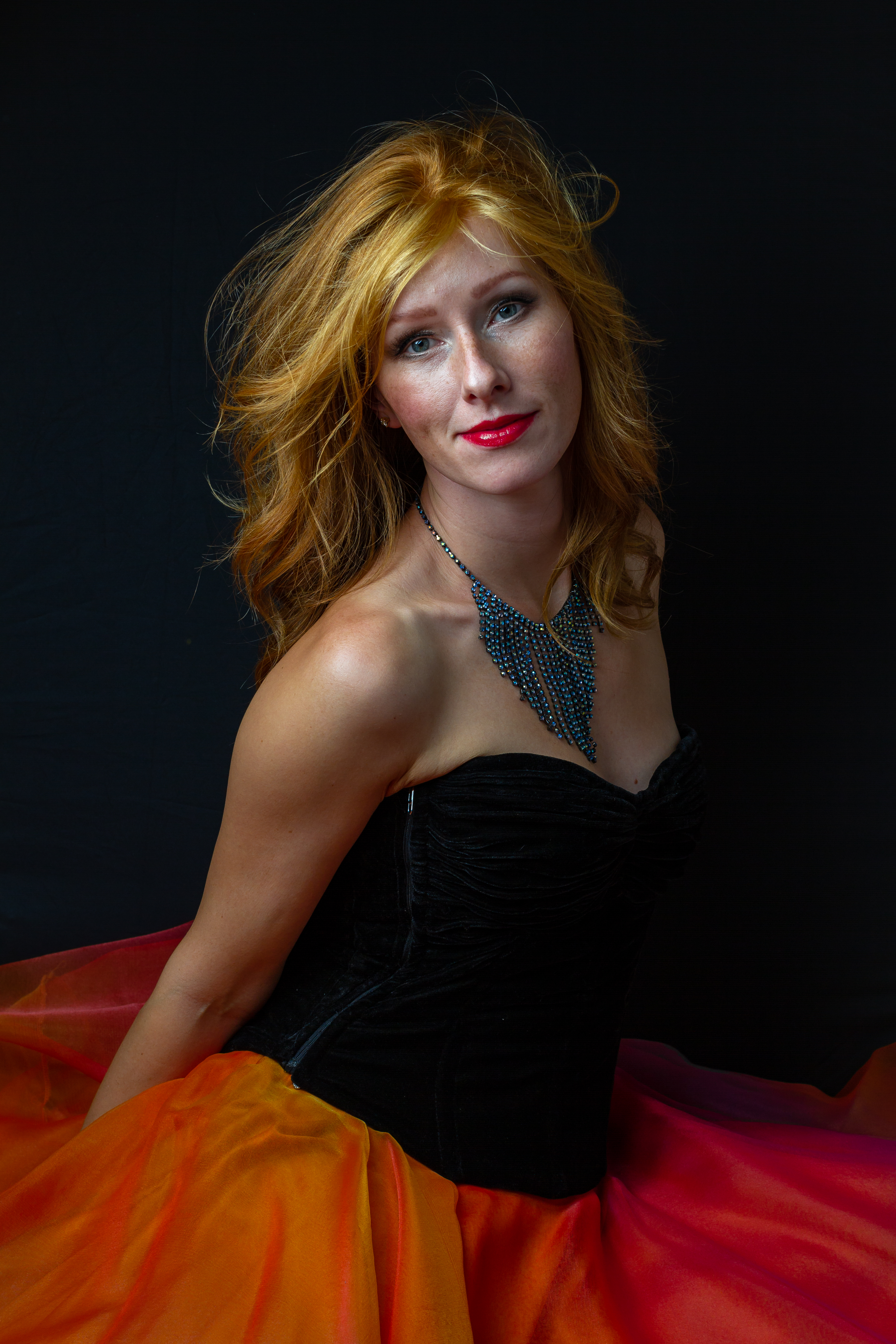
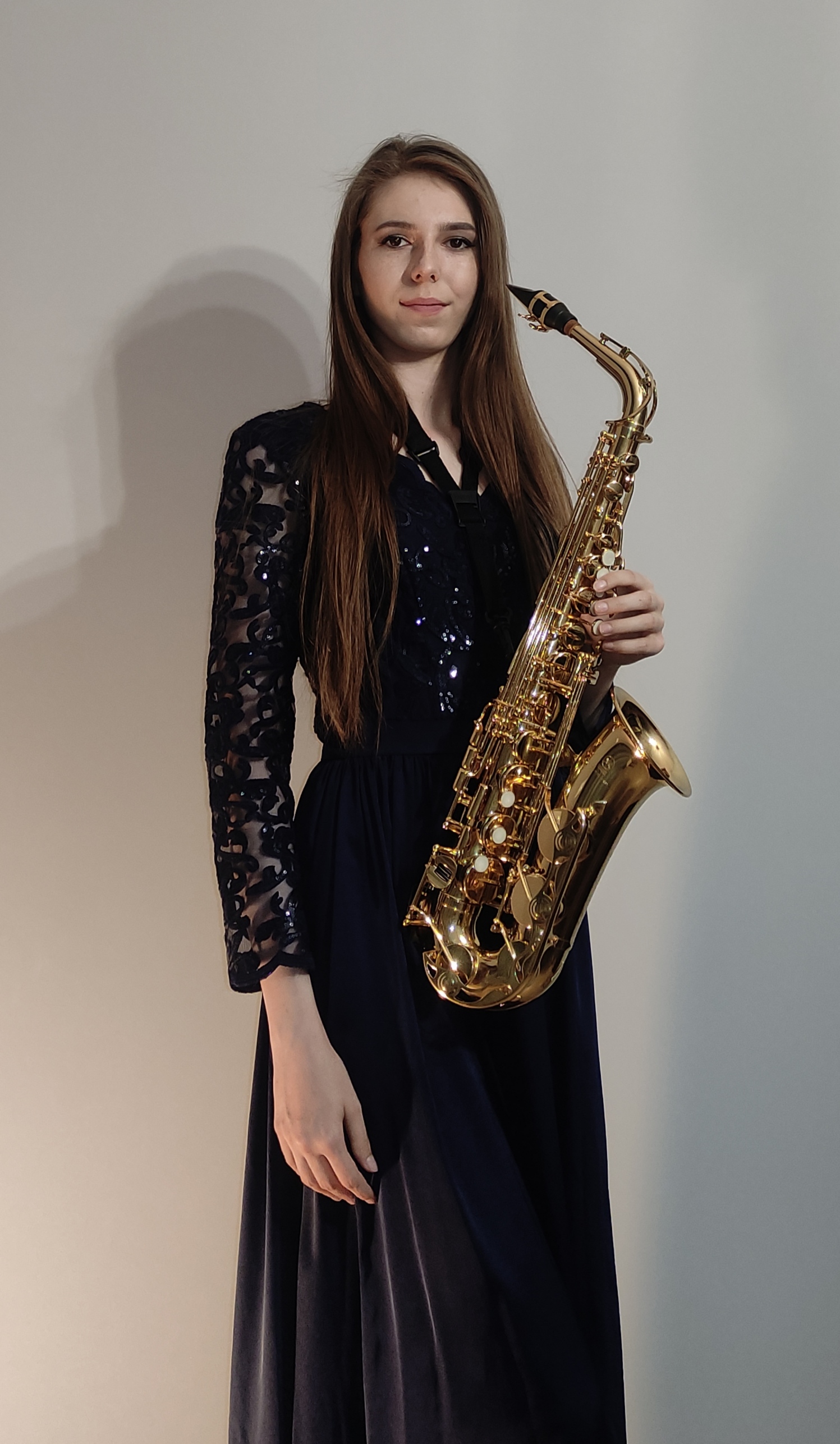
Martyna Waszak
Martyna Waszak is a graduate of the Juliusz Zarębski State Music School in Inowrocław, where she studied saxophone under the guidance of Paweł Trawczyński. She completed both the 1st and 2nd degree programmes. Martyna is a member of the Representative Orchestra of Skulsk Commune and the Wierzbink Youth Wind Orchestra. Her musical journey began at the age of 10. Throughout her education, Martyna actively participated in numerous competitions, including the 2nd Grudziądz Wind Instrument Competition, 7th Kuyavian Meetings, and King of the Stage 2020.
Orkiestra Vabank WOAK
The Vabank WOAK Orchestra was established in 1987 under the leadership of Benedykt Leszczynski, the director of the Provincial Cultural Centre in Toruń. Initially, the orchestra was supervised by Zenon Studziński and Marek Kubiak.
In the autumn of 1988, the orchestra held its first public concert with a modest lineup of only eighteen members. From 1990 to 2004, the orchestra was led by Kapellmeister Edward Ceglarek, whose efforts elevated the artistic level of the ensemble to great heights. The musicians have consistently demonstrated their talent, competing with professional orchestras on numerous occasions. In 1998, the WOAK Wind Orchestra performed in the Danish city of Aabenraa, representing the only amateur band among six professional orchestras from Denmark, the Netherlands, the United Kingdom, and other countries.
The orchestra has gained recognition beyond national borders, having performed throughout Europe, including countries such as the Netherlands, Lithuania, Estonia, and Belgium. In 2000, the ensemble proudly represented the artistic community of the Kuyavian-Pomeranian region at the EXPO 2000 exhibition in Hanover.
Over the years, the orchestra has participated in major regional reviews and national festivals, earning numerous awards and prizes. The repertoire of the Vabank WOAK Orchestra includes a variety of musical styles, featuring obligatory marches and enjoyable pieces such as themes from operettas, popular songs, jazz standards, and evergreen hits from popular music.
From 2004 to 2022, the orchestra was led by Kapellmeister Jerzy Derkowski, and currently, Waldemar Urbański holds this position.
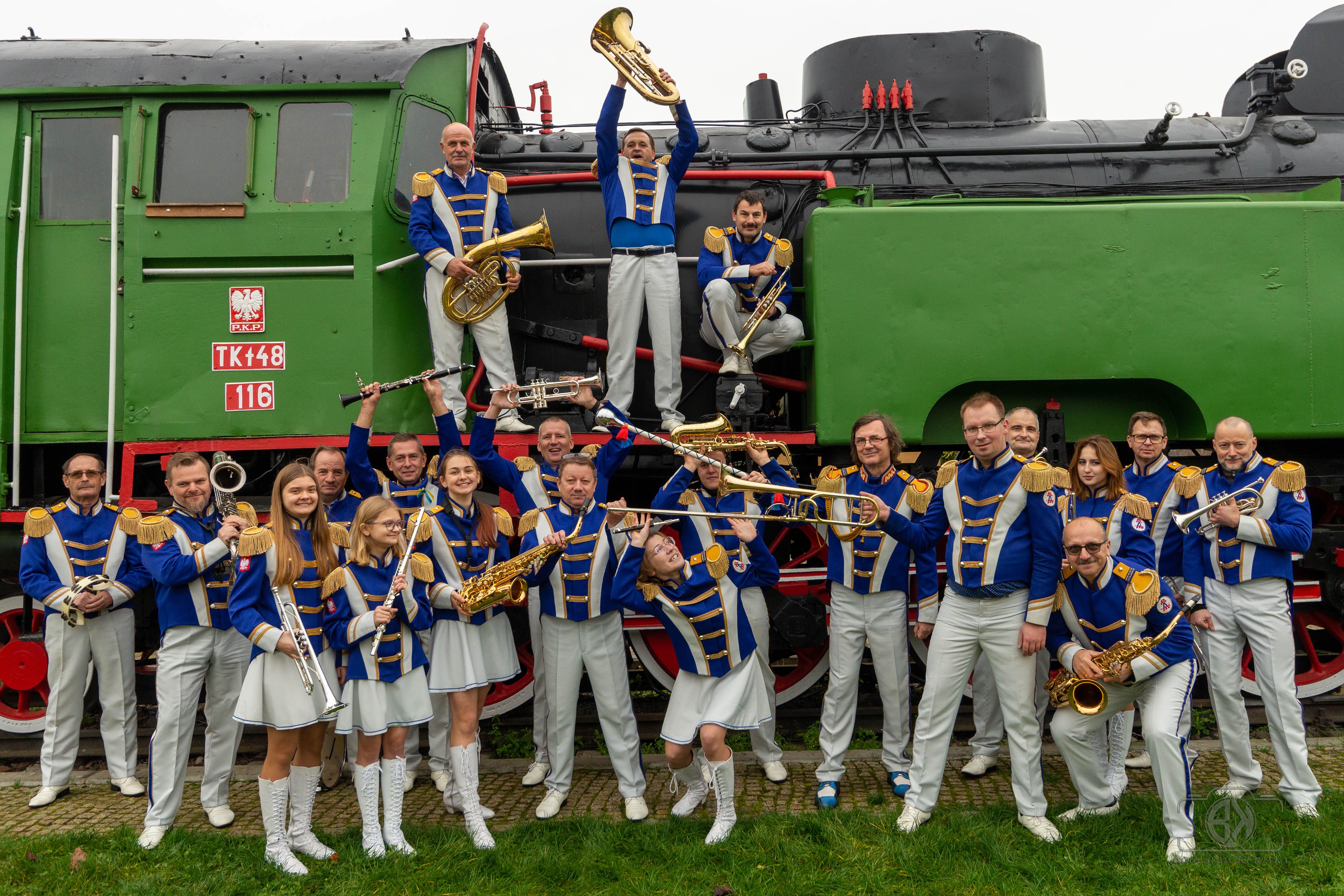
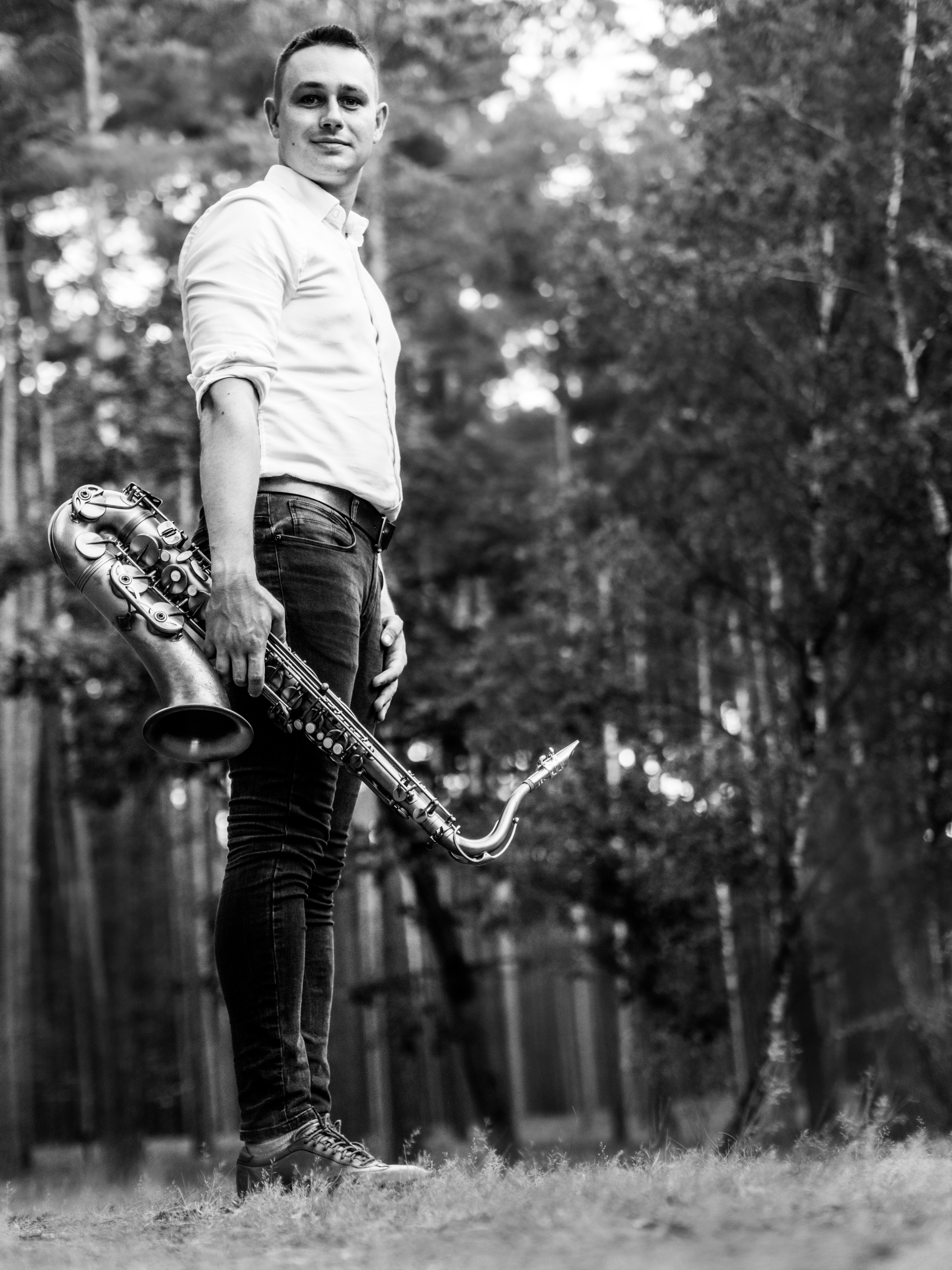
Paweł Trawczyński
Paweł Trawczyński was born on July 6, 1993, in Radziejów. He completed his elementary education at Tomisławice Elementary School in 2006. From 2004 to 2006, he attended the First Degree Music School in Radziejów, studying saxophone under the guidance of Bogdan Jaskrowski. Continuing his musical education, he enrolled at the Music School in Toruń from 2006 to 2012, where he further developed his saxophone skills under the tutelage of Dariusz Zaleśny. In 2017, he graduated with a master's degree in instrumental studies from the Department of Instrumental Music at the Karol Lipiński Academy of Music in Wrocław, studying in the class of Dr. Artur Motyka. Additionally, in 2017, he pursued Jazz and Stage Music studies with Professor Maciej Sikała at the Academy of Music in Bydgoszcz.
Paweł Trawczyński currently teaches saxophone at the 1st degree Music School in Radziejów and the 2nd degree Music School in Inowrocław.
He has showcased his talent as a soloist with the Toruń Symphony Orchestra and has participated in various competitions, including the 2nd International Saxophone Competition in Łódź in 2012. He has achieved notable distinctions in his career, such as
second prizes at the Competition of Young Instrumentalists in Władysławowo (2005, 2006, 2007), a third prize at the School Miniature Competition in Toruń in 2009,
a third prize at the Contemporary Music Competition in Płock in 2011,
and a distinction at the School Miniature Competition in Toruń in 2012.
Paweł Trawczyński is actively engaged in artistic endeavours. He collaborates on a regular basis and performs original music with the band Infected. Throughout his career, he has had the opportunity to work with renowned artists including Kasia Moś, Andrzej Piaseczny, Kasia Cerekwicka, Justyna Steczkowska, Krzysztof Herdzin, Halina Mlynkova, and many others.
Since May 2021, Paweł Trawczyński has held the role of conductor for the Wierzbinek Municipal Wind Orchestra.
Piotr Sałajczyk
Piotr Sałajczyk is a pianist born in 1982 in Warsaw. His discography is impressive, as he has recorded for renowned labels such as DUX, CD Accord, Naxos, and Haenssler. His performances have also been featured on Polish Radio Programme 2, the Belgian radio station Musiq3, Deutschlandradio, and HR2. Known for his dedication to contemporary music, Piotr Sałajczyk has premiered numerous works.
He graduated with distinction from the Karol Szymanowski Academy of Music in Katowice, studying under the guidance of Józef Stompel. He furthered his musical education at the Mozarteum in Salzburg, where he studied with Pavel Gililov. Additionally, he has refined his skills through masterclasses led by renowned pianists such as Alexei Maximov, Wiesław Szlachta, Christopher Wyneken, and Krystian Zimerman. Currently, Piotr Sałajczyk serves as an assistant professor at his alma mater.
His debut CD, featuring the last sonatas of Ludwig van Beethoven and Franz Schubert (DUX), was highly acclaimed and received the distinction of being named ‘Maestro’ by the French monthly magazine Pianiste. A significant achievement in his discography is the release of the first-ever recording of the complete piano works of Juliusz Zarębski, an unjustly forgotten Polish composer of the Romantic era who was also Ferenc Liszt’s favourite pupil. This album, released in 2017 by DUX, encompasses three discs of solo piano works and a fourth disc featuring works for four hands, with Sałajczyk accompanied by Maria Szwajgier-Kułakowska.
Piotr Sałajczyk’s recordings have garnered critical acclaim and international recognition. His exceptional achievements have earned him prestigious awards, including the Pizzicato Supersonic by Pizzicato magazine from Luxembourg, the 5 de Diapason, four Fryderyk Award nominations, the title of the album of the month by Opera Nederland, and a silver medal from the Global Music Award, among others.
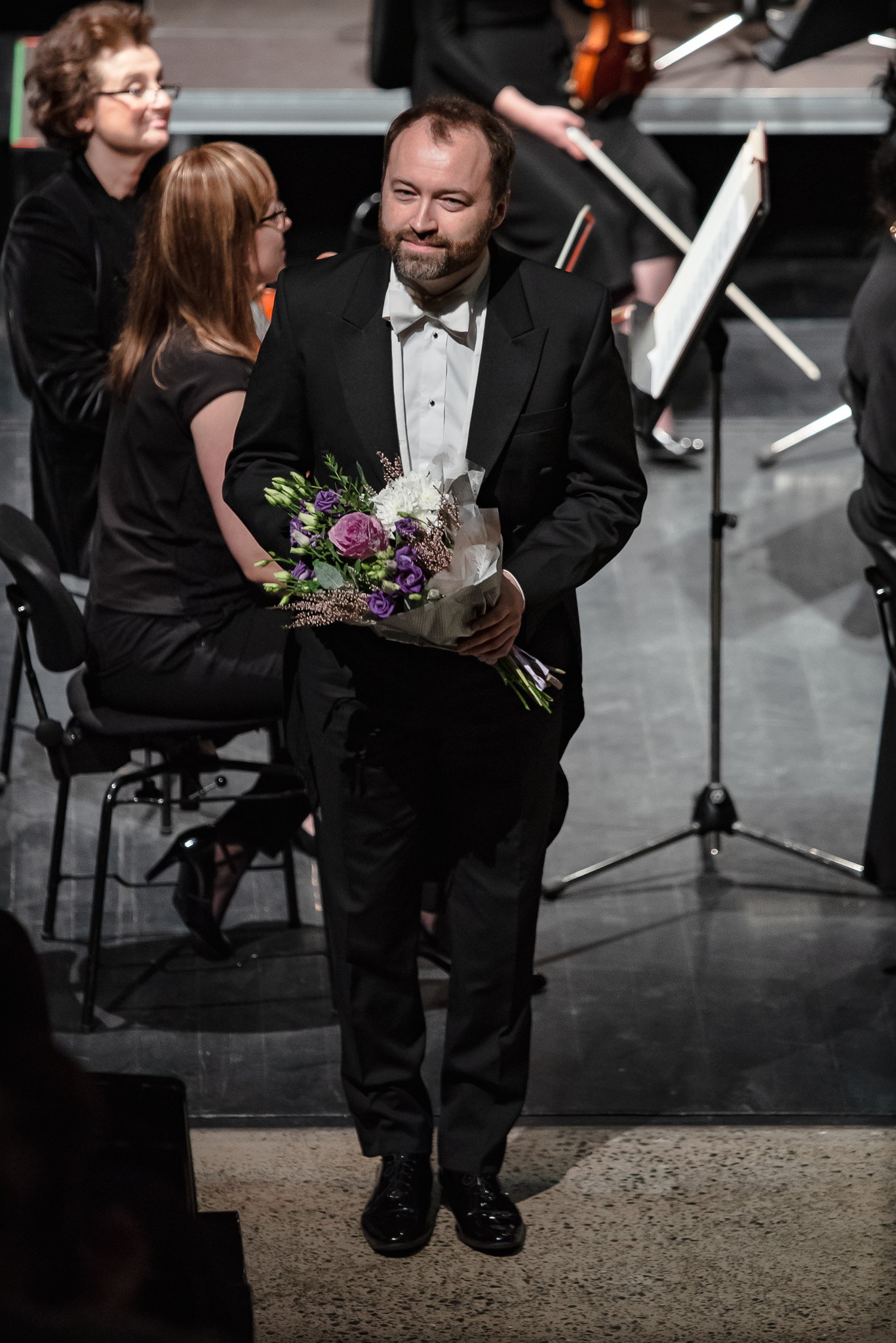
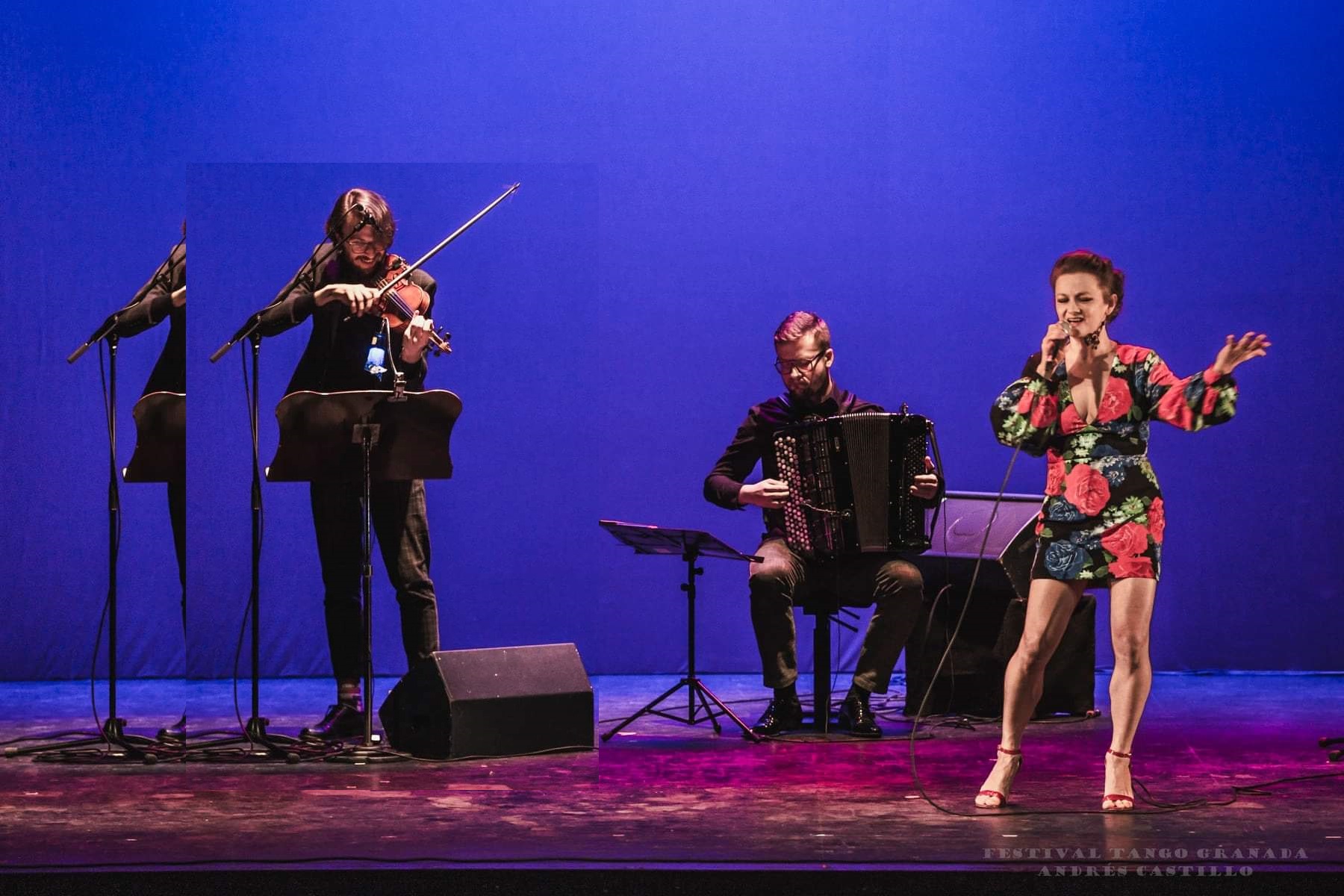
Tango Polaco
Magdalena Lechowska is a Polish artist with a Hispanic soul!
Born in Kraków, Poland, she grew up in Colombia, where she had the privilege of immersing herself in the vibrant and passionate Ibero-American culture from an early age. This upbringing allowed her to absorb the influences of traditional singing that have had a lasting impact on her talent and artistic direction. Magdalena’s repertoire encompasses various genres, including flamenco, bolero, tango, ranchera, and cumbia, among others. She skillfully combines these diverse musical styles, merging different cultural influences and temperaments. Fearlessly experimenting with the classics, she adeptly captures the unique mood of Andalusian singing. Magdalena Lechowska stands as a singular and colourful voice in Poland, a testament to the profound influence of South American music. Her musical versatility, captivating vocal depth, and vibrant personality make her a phenomenon in the Polish market for Latin, flamenco, and tango music. She achieved recognition as the winner of the 2011 Grechuta Festival competition for the interpretation of Marek Grechuta’s songs, together with her former band Aire Andaluz.
In 2015, she released her debut album titled ‘RAICES’, which stands as a one-of-a-kind musical production, blending Argentine tango, Mexican ranchera, Colombian cumbia, Cuban bolero, and flamenco. The album also features her own arrangements of well-known songs by Marek Grechuta, sung in Spanish and infused with the rhythms of flamenco. This fusion of Spanish temperament and Polish classics has garnered praise from both audiences and critics. 2018 saw the release of her second album: TANGO POLACO The album offers a refreshing interpretation of the most renowned Polish tango compositions, presented in a jazzy style that incorporates both traditional tango elements and electronic sounds. The project’s uniqueness lies in its ability to blend the traditions of two cultures, resulting in a versatile musical experience. Not only do the Polish tangos receive a fresh tempo and sound, but they also gain a new dimension by being translated into Spanish, expanding their reach to a broader audience.
Mikołaj Kostka
Mikołaj Kostka is a violinist and composer who possesses a deep appreciation for the aesthetics of violin sound. He is a sensitive soul and a curious seeker, constantly exploring new musical territories. His compositions reflect his experimental nature, delicately balancing between virtuosic intensity and minimalist-ascetic spaces, often venturing close to silence. Maciej Obara, in praise of Mikołaj Kostka, said: “Undoubtedly, Mikołaj Kostka possesses an exceptional gift for composition. His music exudes captivating musicality and beautiful tones. It holds a charming quality, with a willingness to embrace abstractions. We witness an artist of multidimensional talent.”
Currently, Mikołaj is pursuing his studies at the Academy of Music in Katowice. He is also a co-founder of the Raczkowski/Kostka Duo and the leader of Follow Dices, an ensemble that won the 13th Hanseatic Jazz Festival and received accolades at the Blue Note Poznań Competition in 2017. Last year marked his recording debut with both formations, releasing the albums "Duo" (Raczkowski/Kostka Duo) and "Eternal Colours" (Follow Dices) under the independent SJ Records label. These albums were warmly received by domestic critics, showcasing Mikołaj’s exceptional talent.
Wiesław Ochwat
Wiesław Ochwat is a highly active instrumentalist, engaged in various cultural activities such as performing in concerts, co-organizing artistic events, and actively working in teaching and research. In 2014, he graduated with honours from the Academy of Music in Kraków, completing a two-degree course in the accordion class under the guidance of Dr. Janusz Pater. In 2018, he obtained his doctorate from the same academy, with Dr. Paweł Paluch as his academic supervisor.
A significant milestone in Wiesław Ochwat’s artistic development was his participation in a two-year project ‘Italian Accordion Academy’ in 2016. This intensive postgraduate programme focused on the art of the accordion and took place in Urbino, Italy, and Amsterdam, the Netherlands. The project, led by the renowned accordionist and pedagogue Claudio Jacomucci (a former student of Mogens Ellegard) and Kathleen Delaney, a dancer, choreographer, and expert in the Alexander Technique, played a crucial role in his personal growth.
The accordionist's primary interest lies in performing and promoting contemporary music. He has premiered numerous works, both solo and chamber music, many of which were commissioned on his initiative. Wiesław Ochwat has won more than twenty accordion competitions and festivals in Poland and abroad, including the IBLA Grand Prize Competition 2019 in Ragusa, Italy, the Castelfidardo International Accordion Prize in Castelfidardo, Italy, the Andrzej Krzanowski Accordion Competition in Czechowice-Dziedzice, the International Festival of National Music in Przemyśl, and the International Accordion Competition in Poprad, Slovakia. Alongside contemporary music, Wiesław Ochwat also explores classical, improvised, and popular genres.
He has an extensive concert portfolio, performing at various music festivals both in Poland and abroad, including the Czech Republic, France, the Netherlands, Canada, Lithuania, Germany, Norway, Slovakia, Ukraine, Hungary, and Italy. Throughout his career, he has participated in numerous masterclasses and music workshops conducted by esteemed pedagogues such as Alexander Dimitriev, Claudio Jacomucci, Teodoro Anzellotti, Mika Väyrynen, Bogdan Dowlasz, Joseph Petric, and others. Wiesław Ochwat has been a recipient of scholarships from the Minister of Culture of the Republic of Poland, the Rector of the Academy of Music in Kraków, and the Mayor of Brzesko. He has also been recognized as a laureate and scholarship recipient of the Tarnów 'Week of Talents' festival.
For several years, Wiesław Ochwat has collaborated with the Art Forum Foundation, actively contributing to the organization of successive editions of the Kraków Accordion Festival and other cultural events.
Waldemar Malicki
Waldemar Malicki is a renowned Polish pianist known for his versatile talent and captivating performances. His extraordinary keyboard skills allow him to deliver unique interpretations. He is recognized for his exceptional connection with the audience, seamlessly blending musical and verbal virtuosity. With a delightful sense of humour, he surprises the listeners, pushing the boundaries of imagination while maintaining a touch of elegance and subtle spice. He remains classy, avoids introducing politics, and dedicates himself to daily finger exercises, entertaining audiences both in Poland and abroad.
Born on October 3, 1958, in Lublin, Waldemar Malicki began his musical journey after graduating from the Secondary Music School in Lublin. He pursued further studies at the Academy of Music in Gdańsk under the guidance of Jerzy Sulikowski. He continued to refine his skills with renowned pianists Paul Badura-Skoda and Jörg Demus, focusing on chamber music under the tutelage of Erik Werba.
Throughout his career, he has collaborated with nearly all Polish philharmonic orchestras and has performed extensively in Europe, South and North America, and Japan. He has shared the stage with acclaimed Polish singers such as Andrzej Hiolski, Stefania Toczyska, and Teresa Żylis-Gara, as well as distinguished violinists like Kaja Danczowska, Krzysztof Jakowicz, and Konstanty Andrzej Kulka. He has also worked closely with chamber ensembles including the Silesian Quartet and the Wilanów Quartet. Together with his wife, Tamara Granat, Waldemar Malicki formed the ‘Duo Granat’, a unique piano duo in Poland specializing in four-hand piano music.
He has recorded numerous radio and CD albums, totalling around 40 recordings, with labels such as Polskie Nagrania, Polton, CD Accord, DUX, Pavane (Belgium), Adda (France), Koch Records Schwann, Wergo (Germany), and Pony Canyon (Japan). His album featuring works by Karol Szymanowski, recorded with violinist Piotr Pławner, was named the 1998 Chamber Music Album of the Year by the monthly magazine ‘Studio’. In recognition of his artistic achievements, Waldemar Malicki has been honoured with three “FRYDERYKS” - awards of the Polish Phonographic Industry.
He has also conducted masterclasses in Finland, Iceland, North and South America, and Japan. In 1992, he served as a jury member at the Vina del Mar Piano Competition in Chile.
Waldemar Malicki has graced the stage of various prestigious festivals, including the Polish Piano Festival in Słupsk, “Warsaw Autumn”, “Wratislavia Cantans”, the Music Festival in Łańcut, the Krzysztof Penderecki Festival in Lusławice, the Chopin Festival in Duszniki-Zdrój, the Holiday Star Festival in Międzyzdroje, the Mazurian Cabaret Night in Mrągowo, the Festival Cervantino in Mexico, and the Festival Chopin in Geneva. He has also performed at gala concerts and for esteemed cultural and social institutions, such as the Buzek Family Foundation and Alexander Gudzowaty’s “Crescendum est” Foundation. Additionally, he represented Poland on Polish Day at the EXPO in Hanover in 2000.
He founded and served as the chairman of the Society of Ignacy Jan Paderewski. Since 2000, he has held the role of artistic director for the Festival of Musical Virtuosity and Humour in Nowy Sącz. Starting from April 2008, he became a member of the Council of the Foundation Centre of National Creativity.
Waldemar Malicki is also actively involved in hosting music programmes on Polish Television. In these programmes, reminiscent of the style of Leonard Bernstein and Glenn Gould, he skillfully analyses various musical phenomena, often incorporating improvisation. Additionally, he showcases his talent through special recitals of piano improvisation in the style of 19th-century virtuosos, accompanied by humorous narration and commentary. Together with director Jacek Kęcik, he created the music and cabaret show “Co tu jest grane?” [What’s being played?], which aired on Polish Television's Channel I. The show has received numerous awards, including the Grand Prix at the 2005 Good Humour Festival and the Rose D'Or at the Lucerne Festival. Since 2007, in collaboration with Jacek Kęcik and conductor Bernard Chmielarz, he has curated and conducted a new concert series called Filharmonia Dowcipu [The Philharmonic of Wit]. These concerts feature an orchestra of 12 musicians and soloists, offering delightful performances that blend music and humour.
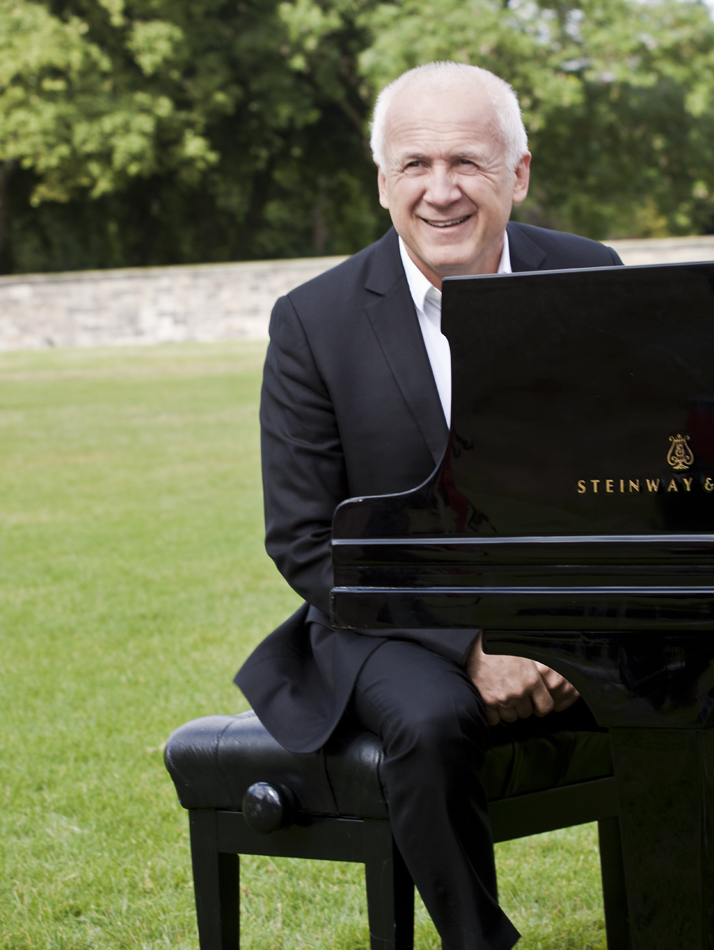
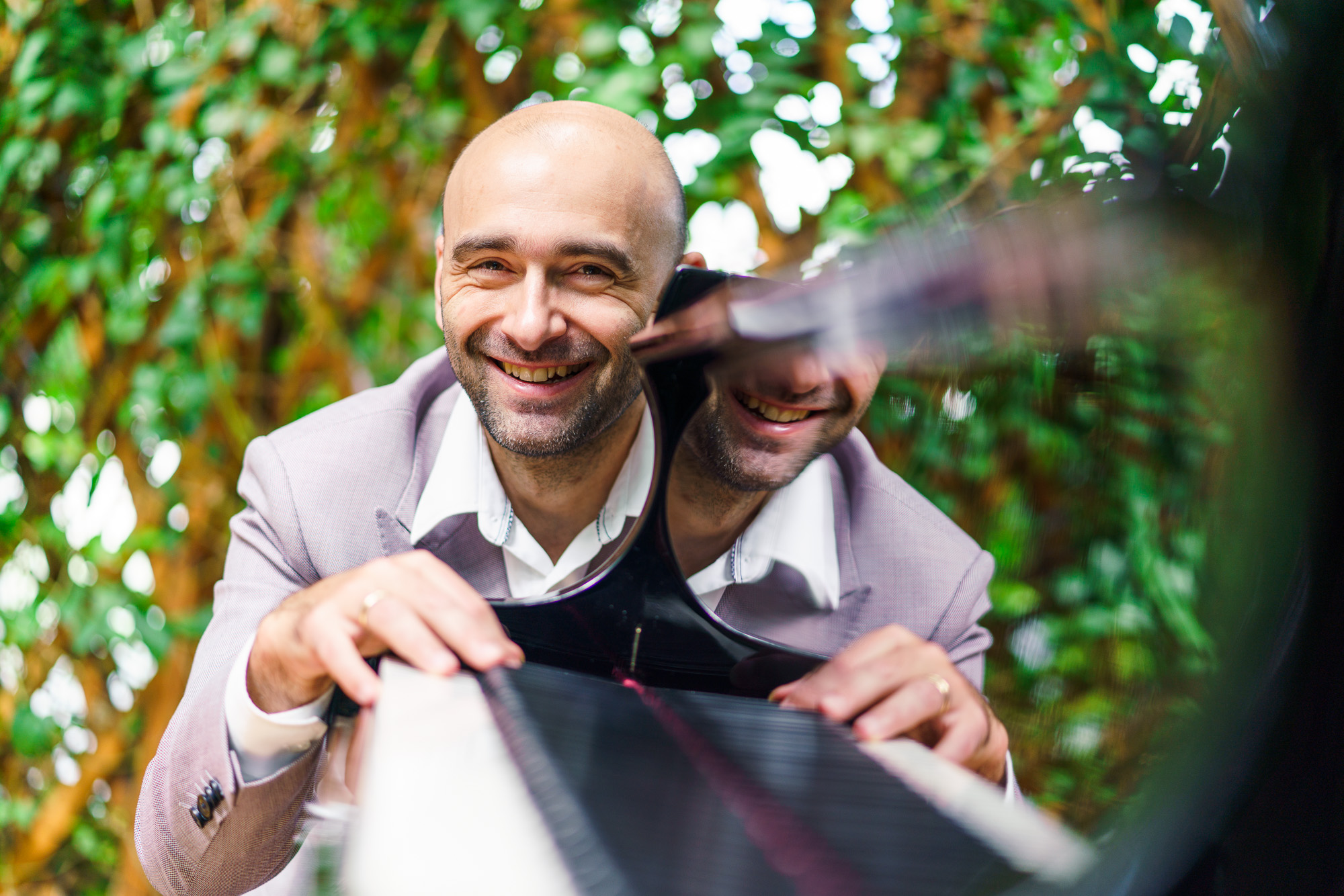
Wojciech Waleczek
Polski pianista, profesor sztuk muzycznych to artysta znany z bezkompromisowego podejścia do sztuki wykonawczej.
Urodzony w 1980 roku, od ponad dwudziestu pięciu lat prowadzi szeroko zakrojoną działalność koncertową wykonując recitale fortepianowe, koncerty symfoniczne i kameralne w 27 krajach Europy, a także w Kazachstanie, Kirgistanie, Uzbekistanie, Jordanii, Palestynie, Algierii, Iranie, Iraku, Tunezji, Katarze, Japonii, Brazylii, Argentynie, Urugwaju, Gujanie, Surinamie, Kanadzie oraz w USA.
Występował jako solista z orkiestrami filharmonii: Kaliskiej, Koszalińskiej, Lubelskiej, Łódzkiej, Opolskiej, Pomorskiej, Rzeszowskiej, Sudeckiej, Szczecińskiej, Śląskiej, Świętokrzyskiej, Wrocławskiej, Zabrzańskiej oraz z Polską Filharmonią Kameralną Sopot, Toruńską Orkiestrą Symfoniczną, Capellą Bydgostiensis, Orkiestrą Akademii Beethovenowskiej w Krakowie, Polską Orkiestrą „Sinfonia Iuventus, Elbląską Orkiestrą Kameralną, Karlowarską Orkiestrą Symfoniczną, Narodową Orkiestrą Kameralną Mołdawii, Ammańską Orkiestrą Symfoniczną, Kaposvárską Orkiestrą Symfoniczną, Orkiestrą Symfoniczną Brzeskiego Akademickiego Teatru Dramatu, Orkiestrą Symfoniczną Stanu Parana w Brazylii, Orkiestrą Symfoniczną Teatru Narodowego w Brazylii, Qatar Philharmonic Orchestra, Orkiestrą Państwową Uzbekistanu. Współpracował z wieloma dyrygentami, m.in: M. J. Błaszczykiem, Ł. Borowiczem, K. Bumannem, G. Chmurą, S. Chrzanowskim, M. Diadiurą, M. Dworzyńskim, M. Fromangerem, Chang Joon-Gun`em, M. Gawrońskim, Cz. Grabowskim, I. Hobsonem, G. Kerenyi. J. Koskiem, M. Lebelem, M. Nesterowiczem, U. Makhmudovem, M. Metelską, N. Morozowiczem, D. Pavilionisem, O. Palymskim, M. Pijarowskim, W. Rajskim, J. Rogalą, Z. Rychertem, J. Salwarowskim, M. U. Sidiq`em, R. Silvą, M. Smolijem, A. Sosnowskim, M. Sugarem, P. Venerim, A. Weiserem, T. Wojciechowskim, M. Wolniewskim, J. M. Zarzyckim, M. Żółtowskim, B. Żurakowskim.
Wojciech Waleczek ukończył z wyróżnieniem Akademię Muzyczną w Katowicach w klasie fortepianu prof. Zbigniewa Raubo w roku 2003. Naukę kontynuował podczas studiów podyplomowych w Vancouver Academy of Music, pod kierunkiem prof. Lee Kum-Sing'a. W latach 2014 i 2017 otrzymał stopnie doktora oraz doktora habilitowanego na Akademii Muzycznej w Bydgoszczy, a w 2022 roku Prezydent RP nadał mu tytuł profesora sztuki w dyscyplinie sztuki muzyczne. Pianista otrzymywał nagrody i stypendia Prezesa Rady Ministrów, Ministra Nauki i Szkolnictwa Wyższego, Ministra Kultury i Dziedzictwa Narodowego, prezydentów Katowic i Gliwic, Sejmiku Województwa Śląskiego, Rektora Uniwersytetu Śląskiego oraz wielu innych Instytucji.
Oprócz aktywności koncertowej artysta zajmuje się też działalnością naukowo-dydaktyczną na stanowisku profesora Uniwersytetu Śląskiego w Katowicach oraz organizacyjną jako wiceprezes Stowarzyszenia SIGNUM w Gliwicach do spraw promocji muzyki klasycznej.
W roku 2017 Minister Kultury i Dziedzictwa Narodowego przyznał pianiście odznakę honorową „Zasłużony dla Kultury Polskiej”, a w roku 2023 brązowy medal „Zasłużony Kulturze Gloria Artis”. W roku 2018 „Srebrną Odznaką Honorową za Zasługi dla Województwa Śląskiego” wyróżnił go Sejmik tegoż regionu. Otrzymał również Brązowy i Srebrny Krzyż Zasługi od Prezydenta RP (2019 i 2023).
(źródło: oficjalna strona https://www.waleczek.com/)
Soyung Yu
Koreańska sopranistka, w 1991 roku wyjechała do Wiednia, w którym podjęła studia na Uniwersytecie Muzyki i Sztuk Scenicznych u prof. Ralfa Döringa. Ukończyła naukę w klasie opery pod przewodnictwem prof. Curta Malma i w klasie śpiewu pod opieką prof. Normana Shetlera. Przez wszystkie lata edukacji wielokrotnie występowała solo i z orkiestrami na znanych muzycznych wydarzeniach w Niemczech, Korei Południowej, Austrii i na Węgrzech. Solistka ma na swoim koncie występy na scenach najsłynniejszych oper: w Operze Wiedeńskiej, Volksoper w Wiedniu, Teatro Filarmonico w Weronie, a także Rumuńskiej Operze Narodowej w Klużu-Napoce.

